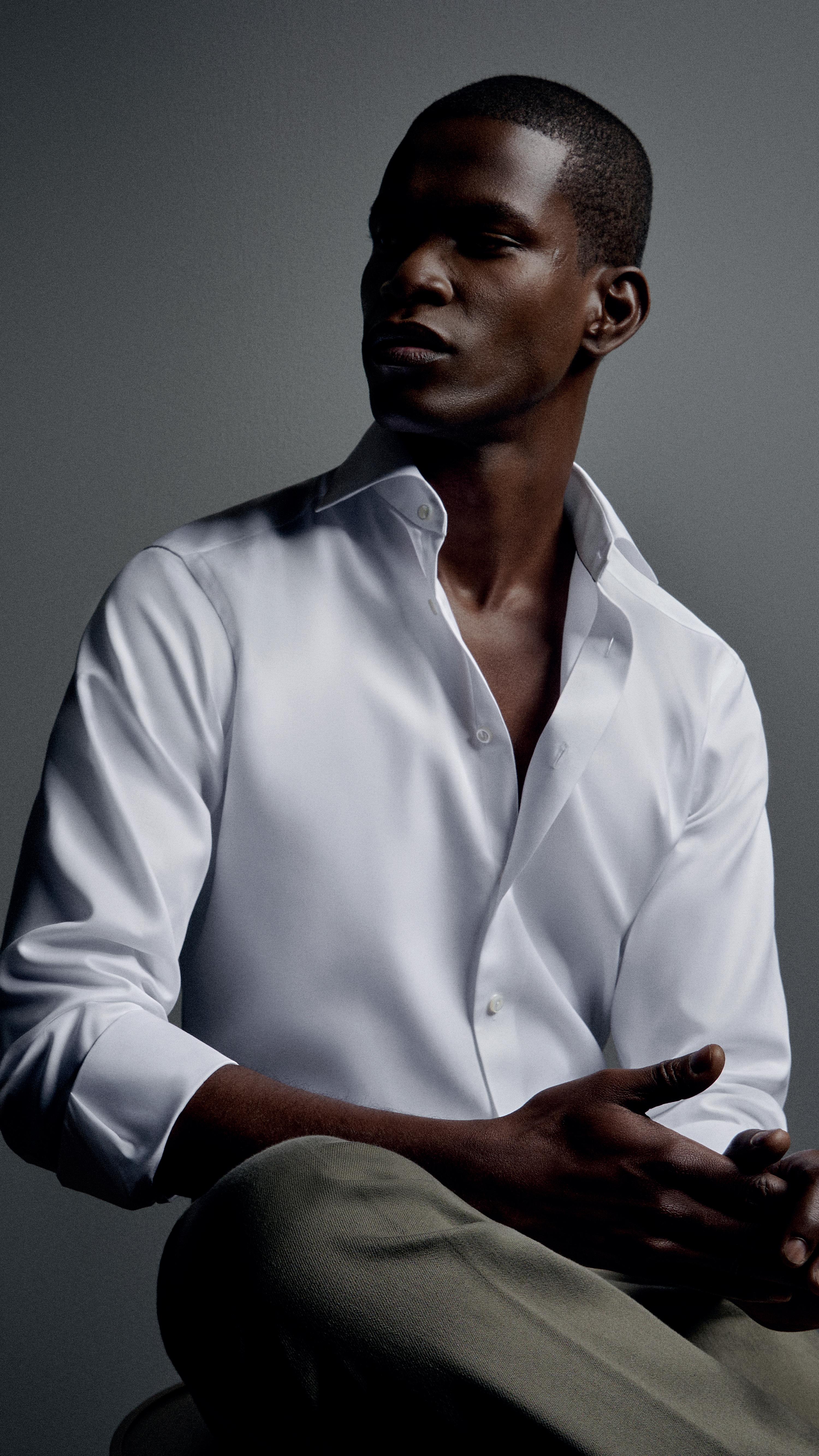HARVARD CRIMSON









BY











BY

NEW BEGINNINGS. Many members of the Class of 2028 began to arrive on campus after months of following Harvard in the news during a year of unprecedented turmoil and controversy. In interviews with The Crimson, more than 40 students said that they closely followed Harvard’s leadership crisis and response to campus antisemitism and Islamophobia as the University was scrutinized in the national media. SEE PAGE 4
During his freshman year, Kaden Y. Zheng ’27 was rarely present at his well-furnished double in Wigglesworth Hall. Instead, he turned his friends’ dorm into a “five-night-a-week hotel” where he would crash after late nights playing FIFA. But not everybody can be so lucky. Chances are, you’ll be sharing your living space with at least one other freshman — possibly for the first time in your life. Cohabitation can be difficult, but also incredibly rewarding, so here’s The Crimson’s guide to making the best out of your roommate experience.
Set Boundaries
Chances are that you and your roommates have different preferences and habits — that’s okay! Don’t expect to be two peas in a pod from the get-go.
Instead, take some time early on in the semester to work through your differences. Discuss sleeping times, overnight guests, shower times, cleaning schedules, and cost sharing to en-
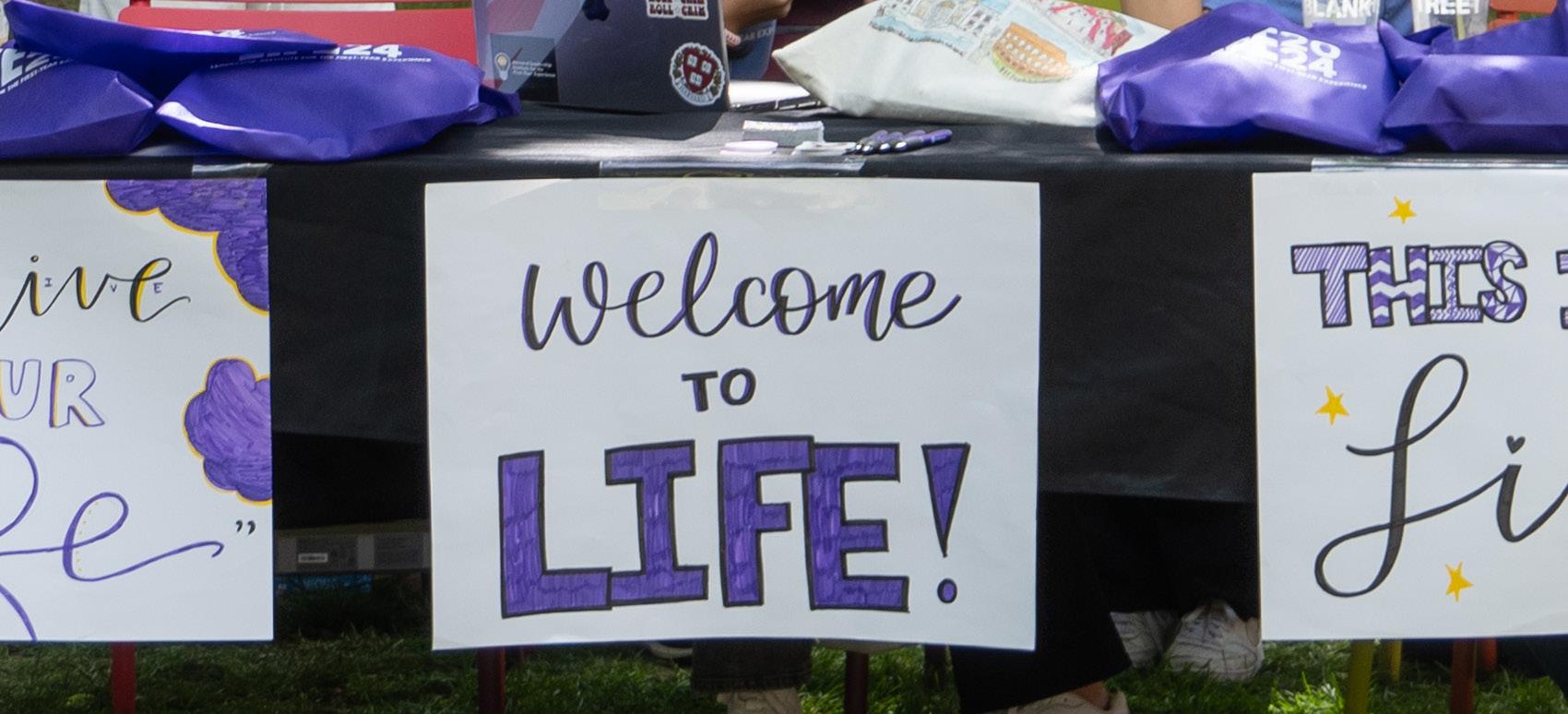
sure you’re all on the same page.
Freshman Proctors will assist in these conversations by requiring all roommate pairs to sign off a baseline set of agreements by mid-September. While it’s easy to discount this document as yet another mandatory exercise in an already busy first few weeks of school, completing it carefully and thoughtfully can save you a significant amount of time and stress later on.
Isaac L. Brown ’27 said understanding your roommates can help create a more constructive experience for everyone.
“You need to work with your roommates in order to establish a status quo that benefits everyone,” Brown said. “If boundaries in that environment are broken, communication is essential.”
Arleen K. Saini ’25 said communication is crucial to set boundaries over personal space, alone time, and other unexpected situations — even beginning an impromptu late-night barbershop.
“Having proactive conversations with roommates has been key over the past few years living in dorms,” Saini said. “From experience, it’s easier to agree on boundaries in advance than to navigate the aftermath of a
botched 3 a.m. haircut.”
And remember that not all roommate relationships are meant to turn into lifelong friendships. As long as you don’t end up taking your roommate to court — looking at you, Mark E. Zuckerberg — you’re doing just fine.
Compromise and Conflict Resolution
Let’s cut past the Visitas illusions: Harvard’s freshman dorms are hardly top-of-the-notch, luxurious living spaces. They can be small, antiquated, and even rat-infested (sorry Canaday residents).
Effectively living in a shared space requires sacrifices from all roommates. But don’t rush it — everybody adjusts at their own pace, said Lia G. Galindo ’27.
“As incoming students, you should set the expectation that compromises might have to be made with your roommates,” she said. “As we come from various backgrounds, nations, and have different upbringings, it is important to be patient.”
You’re bound to run into some disagreements with your roommates at some point — playing
SEE PAGE 6
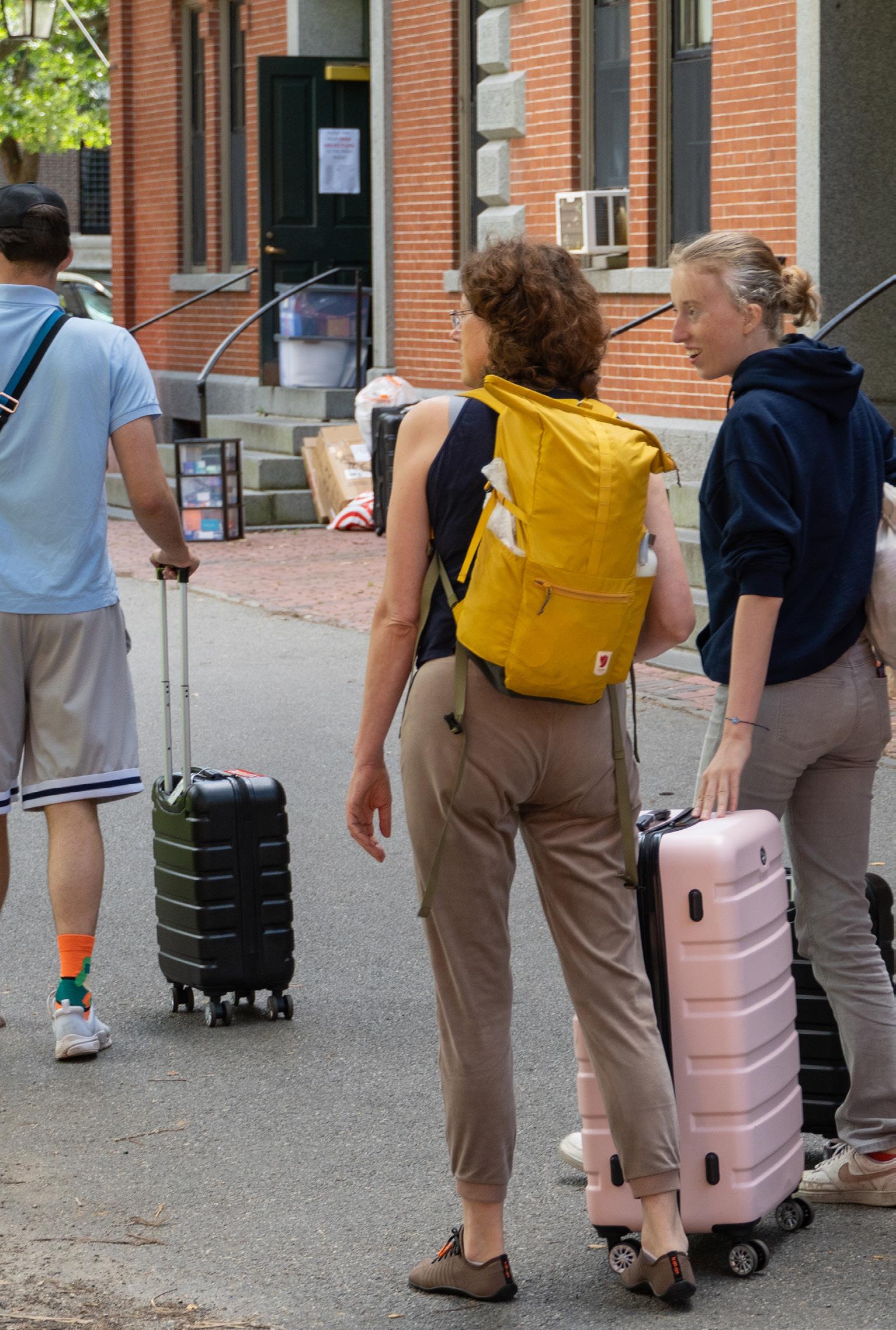
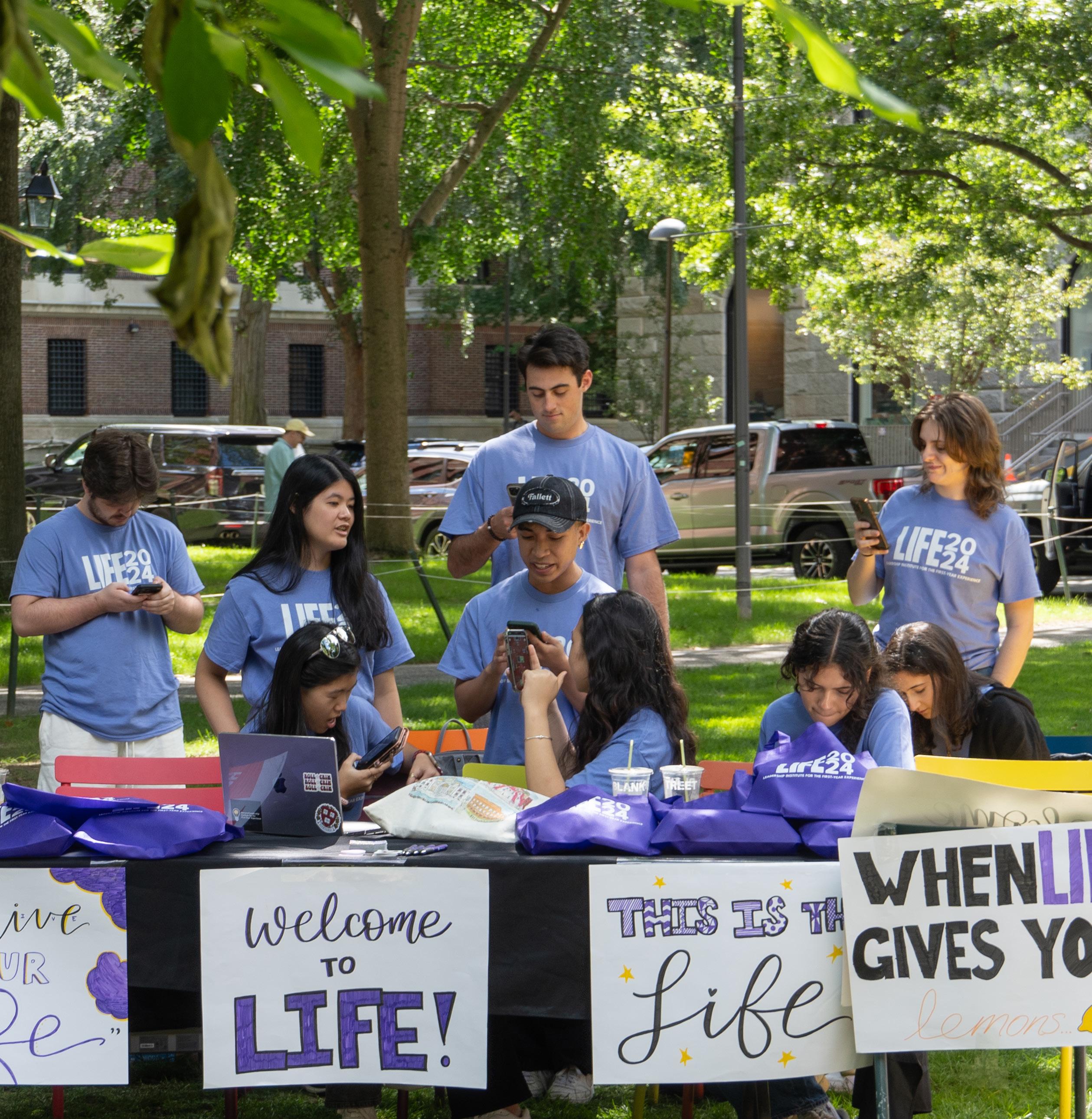

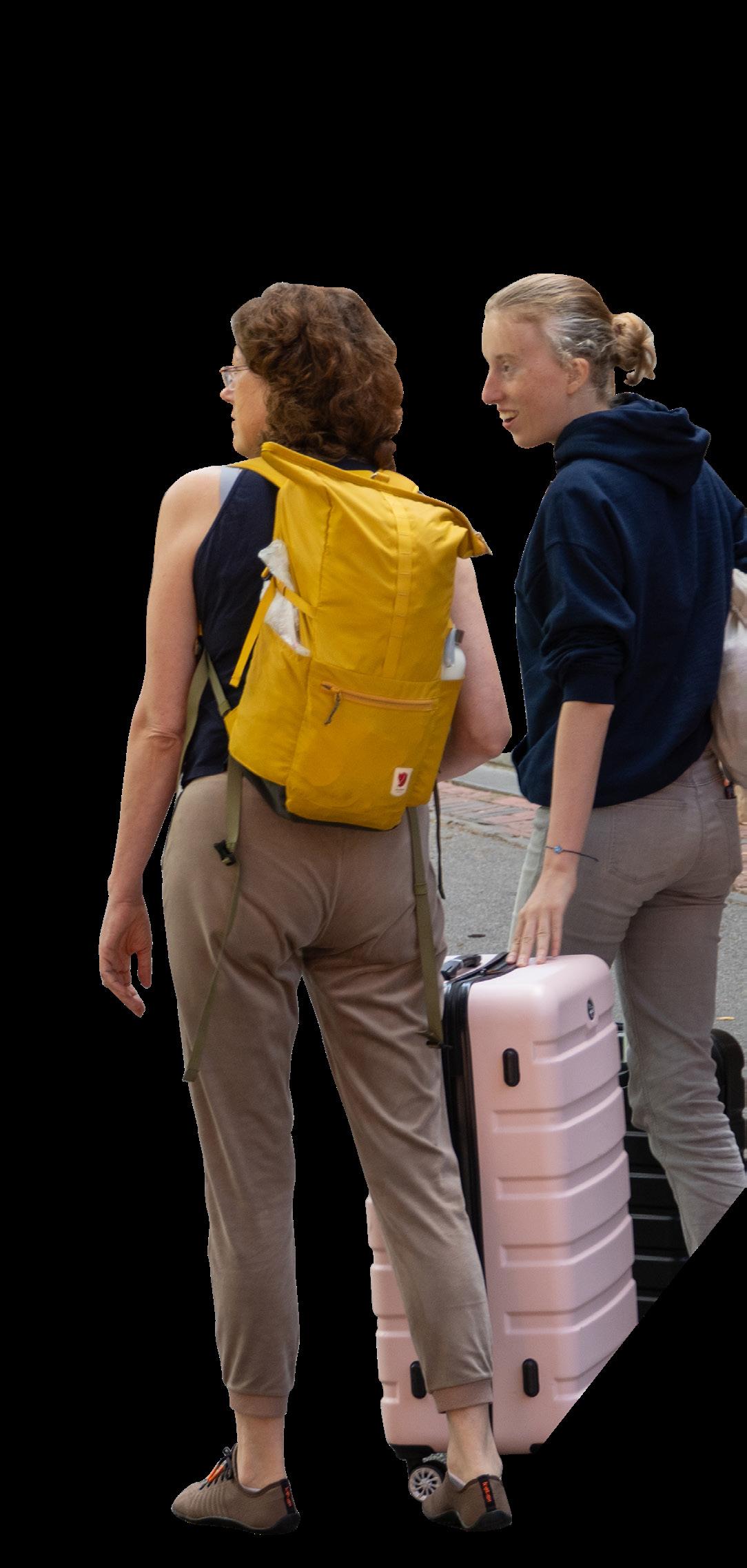
BY ADITHYA V. MADDURI AND CAM N. SRIVASTAVA CRIMSON STAFF WRITERS
pus, Harvard has a wide range of libraries and buildings with study spaces that you can utilize to help you establish a work routine as the p-sets and first essay deadlines start creeping up. Don’t be afraid to move your studying to outside your dorm room and take advantage of all that Harvard’s vast array of buildings and study spaces have to offer!
Smith Campus Center
One of Harvard’s classic study spots, you’ll probably soon find yourself asking friends if they want to “hit up Smith” for a group study session or place to centrally gather.
Located in the heart of Harvard Square, the Smith Center’s modern interior is sure to fit your needs with study rooms of
various sizes, the Collaborative Commons, and the second-floor commons. Whether entrenched in readings in a solo endeavor or simply chatting with friends, be sure to take a break to check out the many eateries on Smith’s ground floor, such as Bon Me and Saloniki Greek. If you want a little more privacy away from the hustle and bustle of tourists who inevitably find themselves in Smith, swipe your HUID to take the elevators up to the 10th floor for a cozy place to study with wonderful views of Harvard Square and relaxing music.
Be sure to leave Smith as 10 pm approaches, though (its closing hour), or you might find yourself being shooed out by HUPD.
Northwest Building
Whether you find yourself on a casual stroll up Oxford Street or have a class section in one of Harvard’s science buildings on the north part of campus, look no further than the Northwest building for spacious study areas and a cafe to spend your BoardPlus.
The basement of Northwest, with expansive tables, sofas, and outlet accessibility, is a versatile place where you can quietly study or knock out those never-ending p-sets with friends. Further, if you have morning or afternoon class in Northwest, consider skipping out on Annenberg and freshening your pallet with a sandwich or pastry from the cafe on the
Annenberg
SEE PAGE 11
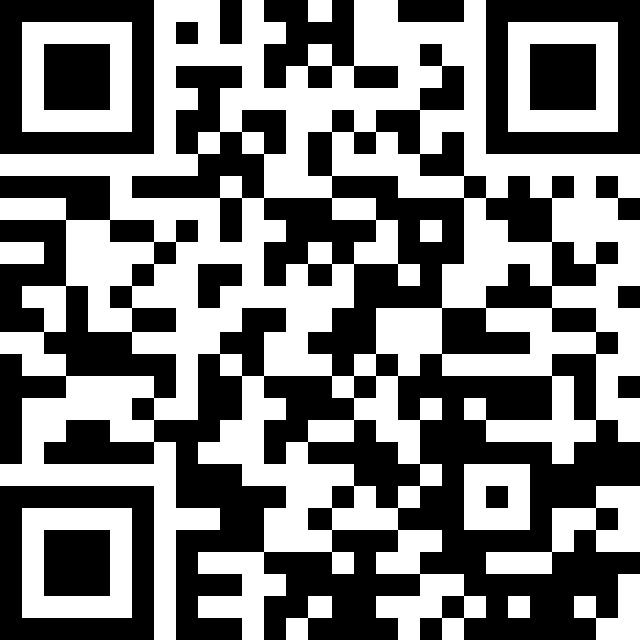
WEDNESDAY AUG. 28
AUG. 29 FRIDAY AUG. 30 MONDAY SEPT. 2
TUESDAY SEPT. 3
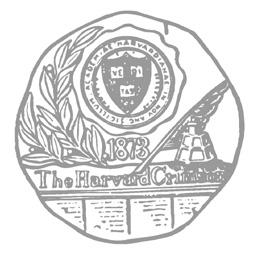
Your first day as a Harvard student has finally come. Before you know it, your 10-minute drive to high school will be a walk through Harvard Yard, the previously unfamiliar faces will be best friends, and your inbox will be flooded with emails aggressively advertising student organizations and classes. During these hectic first weeks, it will be easy to get lost in the dayto-day decisions about who to sit with in Annenberg and finding your classroom in the labyrinthine of the HarvardKennedy School. But keep in mind there are a plethora of events to break up the monotony of your school-year routine. As you navigate the whirlwind that is your first year at Harvard, here are four College events and traditions to look forward to.
Convocation, Sept. 2
Harvard’s Convocation marks the first time your class will meet all together and commemorates the start to your college career! In just a matter of weeks, you and your classmates will fill Tercentenary Theater for a welcoming ceremony led by speakers including University President Alan M. Garber ’76 and College Dean Rakesh Khurana who will welcome you to your new home — and remind you to call your parents, they will miss you. After the ceremony, the crowd of newly declared freshmen — clad in nice dresses and smart suits — will line the steps of Widener Library for a class photo, which will take far longer than anyone is prepared for. (We recommend wearing comfortable shoes).
You and your classmates won’t meet here again until your graduation four years from now, so cherish the symbolic moment and start finding new faces in the crowd!
Harvard-Yale, Nov. 23
On a frigid afternoon in November, Harvard will square off against our arch-rival Yale in an annual foot-
ball game with stakes as high as the temperature will be low. Bundle up in every article of Crimson gear you amassed during orientation, thick gloves, and a hefty jacket as you brave the trek across the Charles River to Harvard Stadium. At the game, let your creativity run wild with the signs and chants — anything to spice up the match is welcome. (Remember, it’s Ivy League football we’re talking about here.) Just know that recycling the “safety school” chant won’t win you any points in creativity. And while the event is colloquially called “The Game,” the weekend has more on tap than just football. Expect late-night festivities and darties at the crack of dawn. (We remind you, though, that the early-morning parties are optional — your head and liver might thank you for sleeping in.)
Finally, the night before the match, look out for the pregame roast. There are few better ways to hype yourself up for the game than to laugh at low jokes about the Yalies and their bulldog mascot, Handsome Dan XIX.
Primal Scream, Dec. 10
At Harvard, we like to consider
ourselves civilized — until the night before finals, that is.
As exam week looms, some stress-crazed students bare it all to streak around Harvard Yard at midnight to relieve their pentup anxiety in an annual tradition known as Primal Scream, where students run a lap around the Old Yard. Be sure not to miss this classic tradition — or, if you choose not to partake, be sure to stay away from your windows.
For our brave primal screamers, our first tip is to run fast and in groups. These tactics may seem obvious, but with over-eager tourists checking out the event, you want to make sure you’re streaking through — not frozen mid-stride in — their pictures. Our second suggestion is to consider undergarments. Seriously, no one will blame you for maintaining some shred of decency.
River Run & Housing Day, March 12 and 13
Though Harvard has several unforgettably unique traditions, Housing Day and “River Run” may be the two most infamous. Housing Day is the magical moment when you and your blocking group
— a group of one to eight students — get sorted into one of 12 upperclassman Houses where you’ll live for the next three years at Harvard. But before you can live out your Harry Potter childhood fantasies, you have to run the river. River Run is when freshmen drink a shot of alcohol at each of the nine houses on the Charles River in an effort to not be placed in one of the three Quad houses. And it’s like nothing else. Herds of freshmen run from house to house, visiting the rooms of upperclassmen they know, or often don’t, to try to complete their daunting mission. But do remember that the informal tradition is absolutely optional and you can also still participate with your friends without drinking any alcohol. When the evening is done, freshmen head to bed only to wake up at the crack of dawn to eagerly wait for members of their new upperclassman house to storm
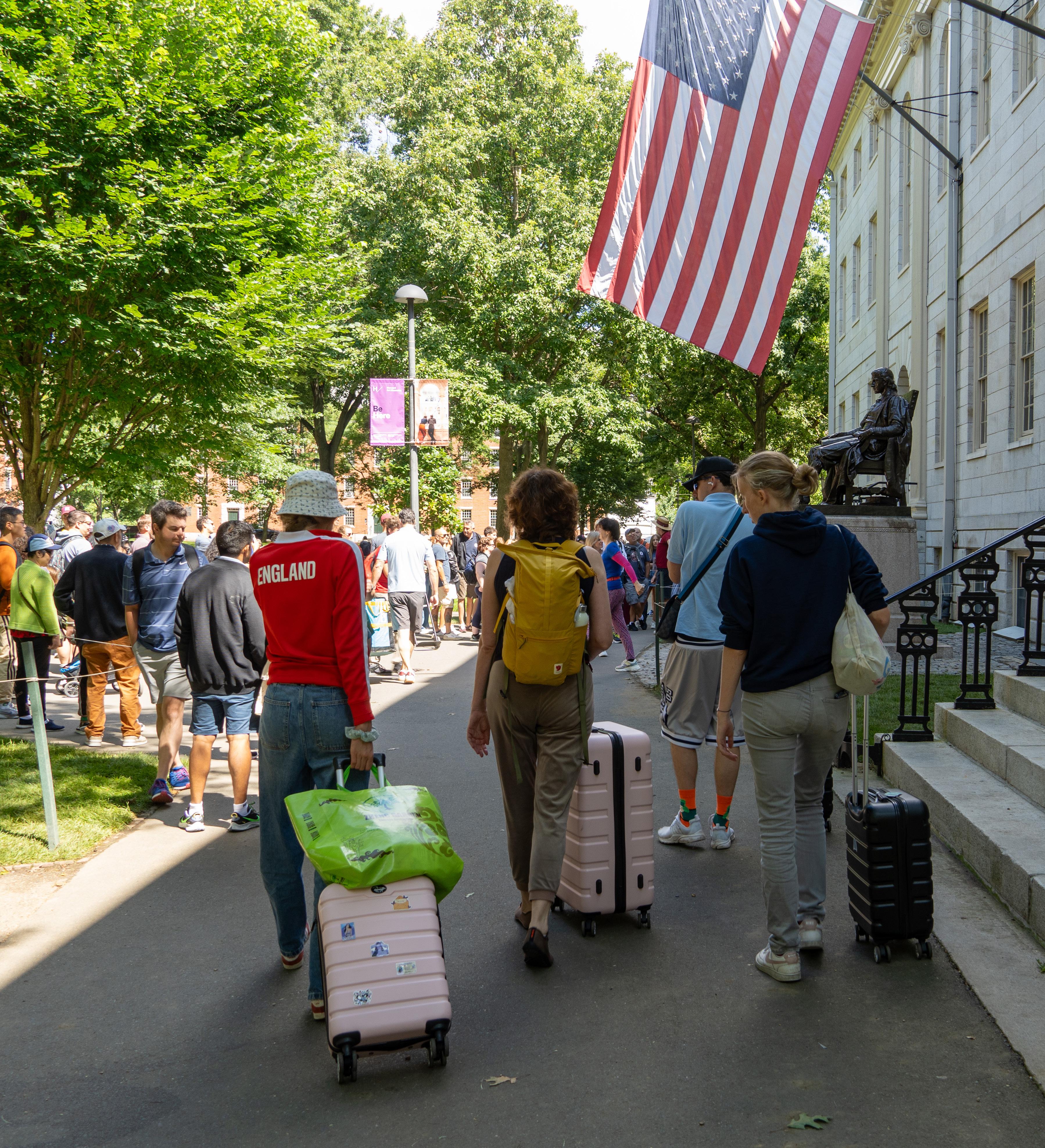
erage in news outlets and social media.
BY AZUSA M. LIPPIT CRIMSON STAFF WRITER
Even before they began arriving in Cambridge on Wednesday, Harvard freshmen said they had become deeply familiar with the University’s turbulent politics which had overshadowed the year leading up to their first semester on campus.
For many incoming students, the University has been associated with controversy and nonstop national media attention since they first started thinking about attending Harvard.
The class of 2028 began to apply just weeks after the Supreme Court ruled against Harvard to effectively end race-conscious admissions practices, submitted their last applications one day before former University President Claudine Gay’s resignation, and roamed Harvard Yard as admitted students just 10 days before it became the site of a pro-Palestine encampment.
In interviews with The Crimson, 42 freshmen spoke about how Harvard’s turbulent year has affected the start of their college experience. Each one said they paid close attention to Harvard’s leadership crisis and campus protests through cov -
The heightened focus on Harvard over the past year put some students in the awkward position of having to defend its reputation before they had even first visited the campus. In particular, Gay’s resignation and the rise in pro-Palestine student activism in the spring sparked a flurry of concern from friends and family members about the University.
Ali Sediqe ’28 said he usually tried to laugh off comments about Harvard’s reputation.
“People would ask me: ‘Do you think they’re going to try to indoctrinate you there?’” Sediqe said. Still, most freshmen said that their opinions of Harvard did not change amid the controversies of last year and that their own enthusiasm for starting college has not wavered. And despite everything, the more typical concerns about moving to Cambridge remained top of mind for some members of the class of 2028.
“Disagreement is just a part of going into a new environment with all sorts of people from different backgrounds,” said Nylah N. King-Boyd ’28. “I think the only thing that’s different is that I need to buy more winter clothes.”
‘Having My College in the News’
When Angelene Nvella Gorniak ’28 posted a TikTok video in December expressing her excite -
ment about being admitted to Harvard, she was jarred by one response amid the other congratulations in the comment section.
“Are you a current antisemite? Or just an aspiring one?” an anonymous user commented under her post.
Gorniak said that she struggled to understand why she was being labeled as antisemitic merely for gaining admission to Harvard.
“It was just crazy because I was just super excited that I’d gotten in,” she said.
response to campus protests and antisemitism and Islamophobia on campus. The initial comments were usually critical of Harvard, she said.
“I just avoided speaking about it if I could, because I didn’t want to put myself in an argument or to be a representative of anything to do with the school,” Popat said.
“It was almost described as a concession, where it’s like, ‘Oh it’s an amazing school, but did you hear about all this weird stuff going on?’” she added. “And that comes from both
I just avoided speaking about it if I could, because I didn’t want to put myself in an argument or to be a representative of anything to do with the school.
Incoming Harvard freshman
While several students said the negative comments about Harvard mostly manifested online and on social media, many others said they also fielded in-person questions about the University’s decisions well before the start of their own Harvard experience.
Sarita Y. Popat ’28, who was accepted early to Harvard in December, said people with varying political views approached her to discuss the University’s
sides.”
Some students said those who approached them to talk about the potential campus activism in the fall seemed to do so out of concern for their own safety.
“A lot of people in my hometown were like, ‘Try to be careful when you’re on campus, and maybe steer clear of that,’” said Chantel A. L. De Jesus ’28.
Johnny H. Perkins ’28, an incoming student from Kansas,
said he has thought a lot about how the tensions on campus over the war in Gaza will color his first semester of college.
“As first years, being right next to the Yard, which is where a lot of the protests were going on, it’s definitely something you have to think about — how will you interact with what’s going on?” Perkins said. “You get asked that question by a lot of people.”
Harvard spokesperson Jonathan L. Swain declined to comment for this article.
Alex I. Draghia ’28, who spent a gap year in Romania after being admitted to the Class of 2027, said he had extra time to prepare to enter an institution that “always has a magnifying glass over it.”
“I just got used to it, from that point forward, to having my college in the news,” Draghia said.
The global headlines sparked by Gay’s resignation elicited questions from “everybody, everywhere” about the turmoil on Harvard’s campus, according to Draghia.
“I haven’t gone there — I wouldn’t know what to tell them,” he said.
Several students said their firsthand experiences at Visitas — the College’s admitted students weekend — showed them an encouraging alternative view that contrasted what they had seen online.
Upon visiting campus, Hudson L. Byrd ’28 said protests and political tensions had less of a presence than he had expected.
“Once I got to campus, I was like ‘This is really cool,’” Byrd said. “Like, it’s not as big of a deal as the media sometimes makes it out to be.” For Luna Y. Yin ’28, the chance to visit campus showed that students and faculty are “really separate” from the administration’s actions, she said.
“When I was on campus there was a lot of excellent community, solidarity, and kindness that I saw there, and that has stuck with me more than the decisions of the administration,” Yin said.
During Visitas, Kim S. Cortes-Martinez ’28 followed Harvard student groups like The Harvard Crimson on social media — a move she said proved helpful in the following weeks, when she began to hear “misinformation” in discussions and media portrayals of the encampment protest that took place in the Yard.
“It was refreshing knowing that I was getting more accurate information from student-run accounts and from the students themselves that were protesting,” Cortes-Martinez said.
‘When We Speak, the World Listens’ Though Harvard’s newest batch of undergraduates are already familiar with the intense scrutiny on the University, they may find themselves directly under the spotlight as their first semester begins. The class of 2028 are mem -
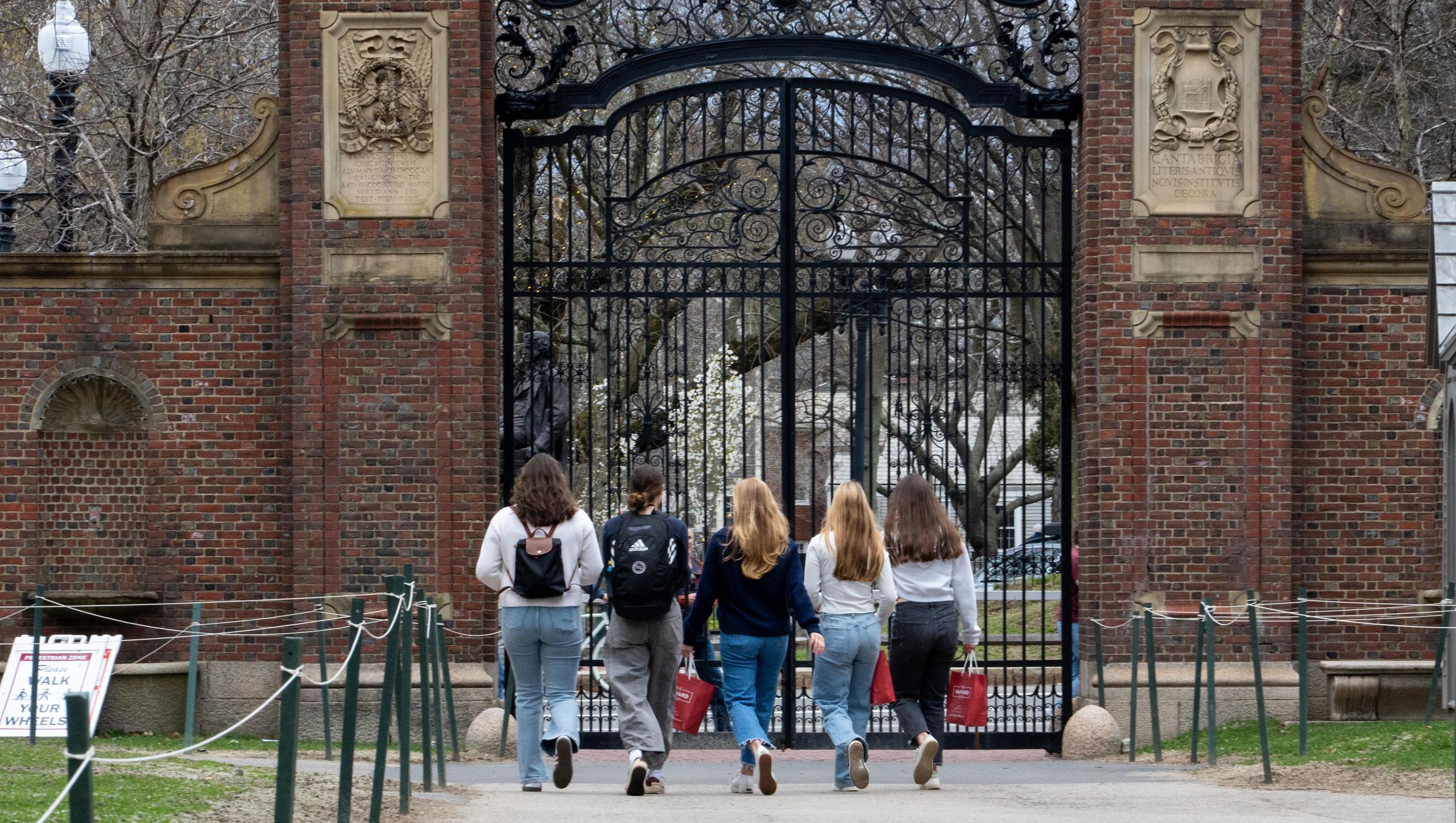
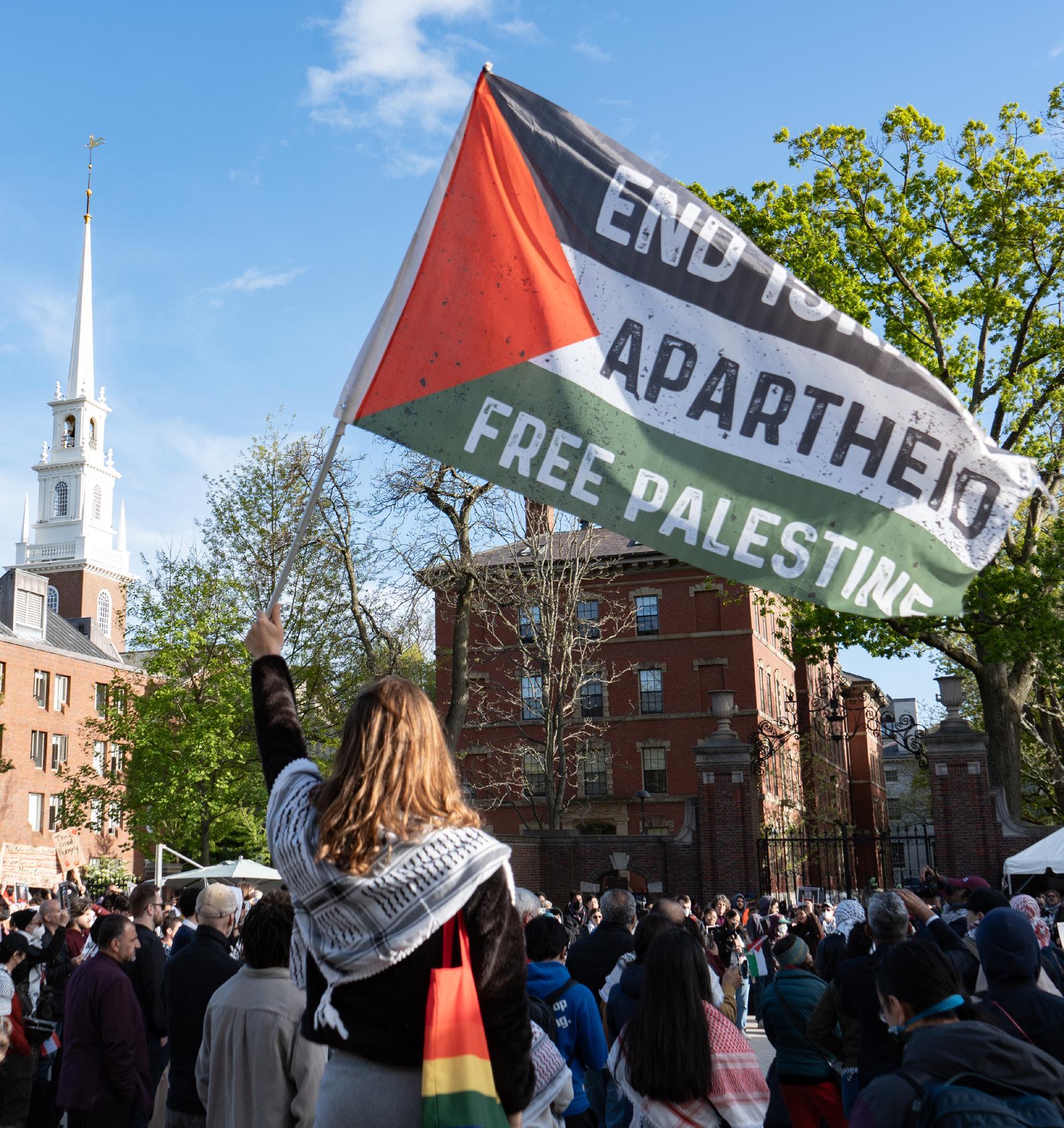
A protester waves a flag during a rally
bers of the first admissions cycle since the Supreme Court’s ruling on affirmative action, and many are waiting for Harvard to release the demographics of its freshman class to determine how the decision has impacted the University’s efforts to admit a diverse student body.
Many politicians are also closely watching how pro-Palestine student activists at Harvard will organize campus protests. House Committee on Education and the Workforce Chair Virginia Foxx (R-N.C.) wrote in a letter last week to University President Alan M. Garber ’76 Garber that he must detail how he is preparing to handle campus protests this fall. Last semester, pro-Palestine protests on college campuses across the country made headlines, including the 20-day encampment at Harvard.
Nick D. Best ’28 said the pro-Palestine protests at Harvard were frequently brought up by family and friends during his process of applying to attend Harvard — which one of Best’s family members called a “liberal training ground.”
“They were like, ‘Oh, you’re not going to start protesting now, are you?’” Best said. In an apparent anticipation of a resurgence of protests, the University updated its campus use guidelines earlier this month, prohibiting chalking and unapproved signage. Several incoming freshmen said reading about the new restric -

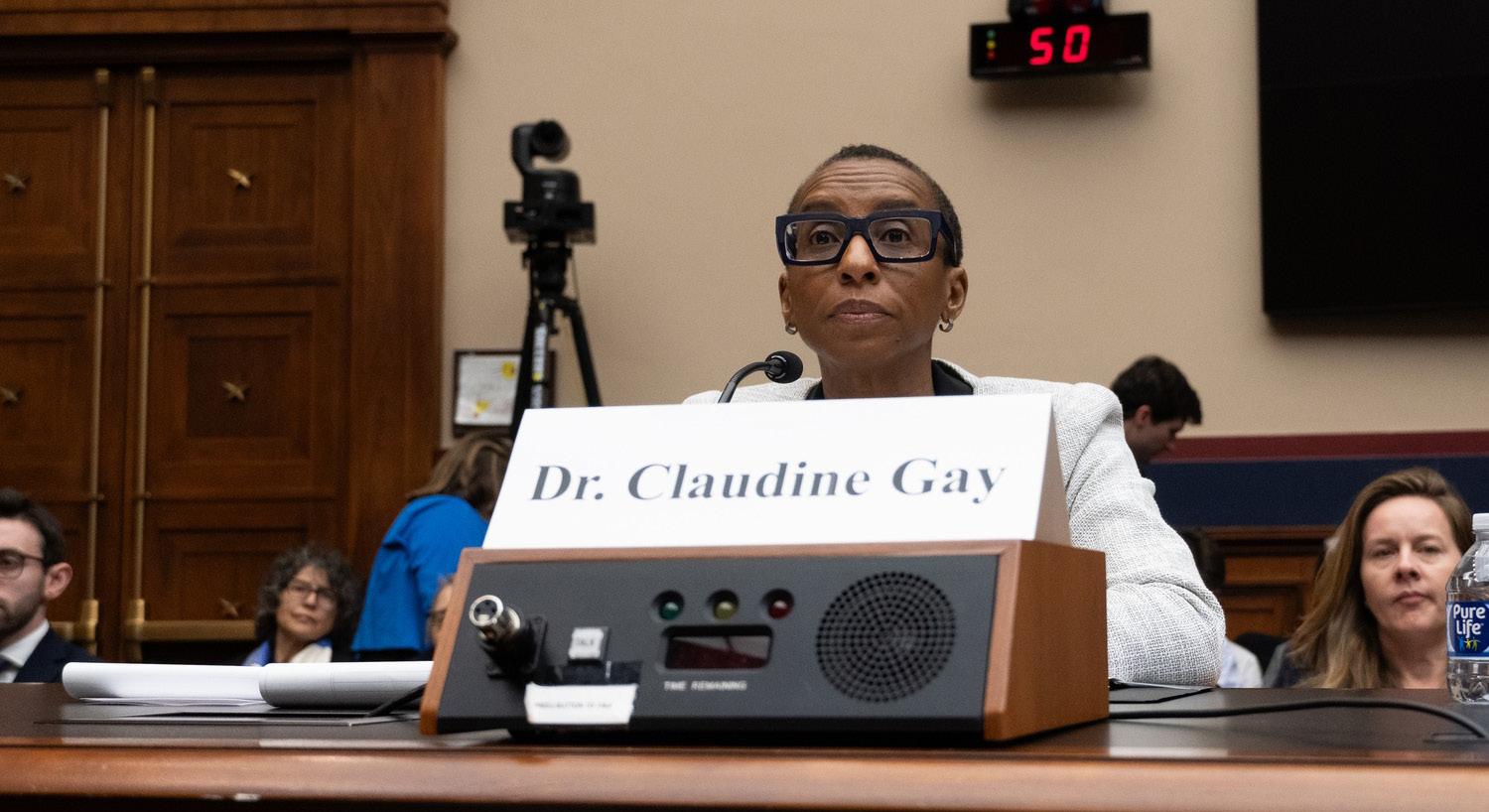
tions led them to wonder about the continuation of pro-Palestine organizing at Harvard. Anthony C. Bynum ’28 said he is “curious” to see whether more protests unfold and will be “on the lookout” for them this fall.
“That’s not something that I would be a part of, or anything like that,” Bynum said. “I just kind of want to be at school, and I don’t want to see people get expelled or anything.” Some students, like Yin, said they hope to get involved with campus protests.
“It really seems like a great opportunity to make those connections, to show up for something meaningful. Especially because Harvard has such a huge spotlight on it, I just have the feeling that Harvard students, when we speak, the world listens,” Yin said.
“It’s an important position to have, and I think we can do something useful with it,” she added. “That’s a really great privilege.”
Though Hanah Kim ’28 said she was “in disbelief” when she heard about the suspension of
pro-Palestine protesters, she said she still intends to participate in student activism.
“I do believe that I will be partaking in protests, regardless of whatever cause they may be for,” Kim said. “I am concerned that my partaking in something that represents my beliefs will have me facing consequences that Harvard deems acceptable for those actions.”
But the global platform granted to politically outspoken Harvard students is less attractive to some freshmen, even deterring them from engaging
with campus activism. Tigran Sahakyan ’28 said that while he fully supports “who want to make their voices heard if they care about the issue,” he personally would not participate in order to avoid “being the center of attention.”
“I would probably consider being more active if the protests didn’t make national news,” Sahakyan said. Alex S. Jun ’28 said the attention on Harvard made him more apprehensive about joining politically oriented student groups.
“Your affiliation with groups can cause consequences, or you to be grouped in with people who you don’t necessarily agree with, or who do things you don’t agree with,” Jun said.
“I now don’t — necessarily, in the start — want to join groups that are really committed or have really solidified ideals,” he added.
Sediqe said he expects to be “more cautious” about how he acts on campus.
“Really anything anyone does there can be subject to more scrutiny in terms of media and people who are looking in on it,” he said. “So just for me personally — being more careful what I do, what I say, and how I present myself.” The fall semester also marks a new start for Harvard’s central administration. Earlier this month, the Harvard Corporation — the University’s highest governing body — permanently installed Garber and Provost John F. Manning ’82 in their roles.
Pointing to Garber’s and Manning’s appointments, Perkins said he found it “exciting” that the class of 2028 would be “entering Harvard at the same time” as new members of top leadership “look for an identity” for the University.
“In the end, it is a good opportunity for this class to realize there is a time of change going on — but we get to help decide what that change is,” he added.
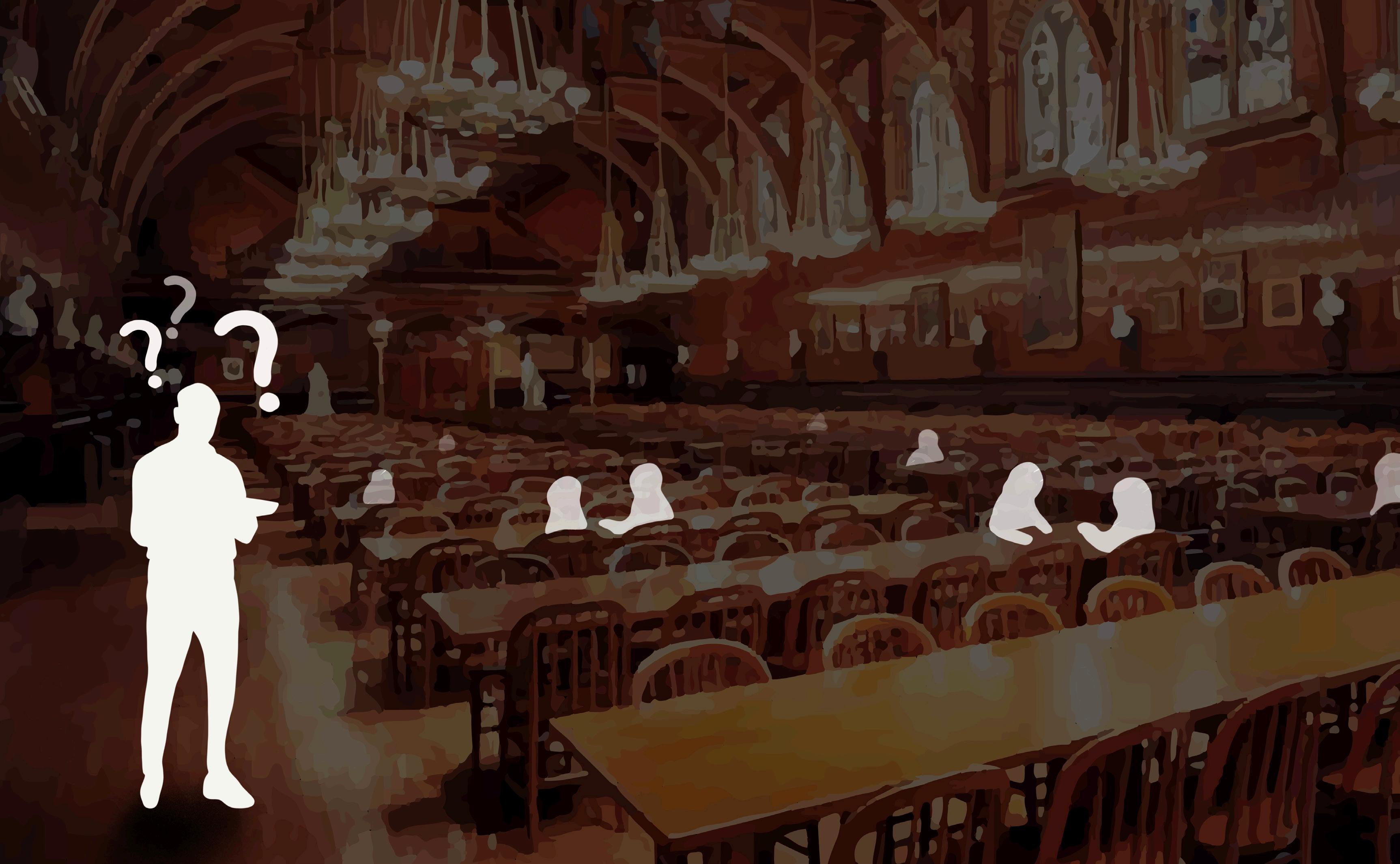
BY MATAN H. JOSEPHY CRIMSON STAFF WRITER
Welcome to Annenberg: the enormous, gothic, and oft-photographed dining hall where nearly 2,000 freshmen go to eat, study, and gossip. It’s one of just a few places during a student’s time at Harvard where their entire class shares what is quite a unique experience, largely closed off from upperclassmen.
But as soon as the comparisons to Hogwarts’ Great Hall wear off, Annenberg can be as labyrinthine as it is grand — a messy web of social cues and ex-
pectations, apparent as early as move-in day. If starting classes at Harvard is like getting thrown into the deep end of a pool, Annenberg can be like an underwater Hunger Games. Adjusting to college life doesn’t have to be hard, though. With a little bit of thought, freshman dining can be a great place to make core college memories. Here are the best — and worst — things to do in ‘Berg.’
The Do’s Annenberg may be one of the few Harvard-specific social experiments that actually works. Countless friendships are made by accident as new students from all over take a seat at random tables and bond.
Annenberg can be as social of a space as you want it to be, so remember: You won’t have many
other opportunities at Harvard to form connections in such a lowstakes environment. Use it as a means of branching out. Sit with new people, start conversations, and introduce yourself. The ‘Harvard Intro’ — name, dorm, concentration — may get old, but it gets the job done.
Annenberg isn’t just defined by the students, though. It boasts a staff of dozens of Harvard University Dining Services employees, each there to make sure the place runs smoothly. They work hard to make Annenberg a great place to eat, so take the time to introduce yourself and get to know them. Above all, treat staff with respect — no matter what. Regardless of how stressed you may feel, how fast you’re trying to eat, or how long the line is, taking it out on a HUDS employee is never the answer. Be nice!
Also, be willing to explore the options that Annenberg has. While it may not have a madeto-order grill, HUDS offers some great sleeper picks in its lineup — Annenberg hot chocolate, for example, is criminally underrated. And definitely go to Brain Break. Make the walk from the Yard and study with friends over a late-night — some would say early-morning — snack. It’s usually emptier, which can make it a lot more relaxing, and you’ll almost always run into at least one person you know. Plus, the snacks just hit different when it’s a Monday night and the Economics 10 problem set that you still haven’t started is due in an hour.
The Don’ts
Still, Annenberg doesn’t lack opportunities for faux pas. For all the good it can offer, there are al-
ways things to not do — seriously, don’t be ‘that person.’
For one, remember to bring your ID. There’s nothing worse than rushing to Annenberg between classes, hoping to squeeze in some red spiced chicken before your Expos section while finishing your third Math 1a problem set of the week, just to wait in line to enter because someone swears that their ID “is just somewhere in my backpack, can I just show a photo of it instead?”
The HUDS staffer doesn’t believe you, and please know that no one else does, either. Make sure you have your ID before you get to the swipe machine, and if you don’t, go find it! Don’t hold everyone else up.
Speaking of lines, Annenberg offers more than its fair share of waiting.
If Harvard’s Economics epartment teaches that rational
agents optimize, then Annenberg may prove that Harvard students aren’t that rational after all. Remember to use both lines for food, not just the one closest to the entrance. And when you’re in line, make sure to be mindful. Don’t spend forever scooping fries or getting water. If you’re making a waffle at breakfast, make sure to use the non-stick spray and come back to it before the timer elapses — don’t make everyone wait there awkwardly until you pick it up. Harvard can be overwhelming, but Annenberg shouldn’t be. As you eat your first meal under its gilded chandeliers, don’t be afraid to take a risk: talk to someone new, sit at a random table, maybe even try some grape pizza. It’ll be gone before you know it.
your preferences, try to resolve conflict through accommodation.
Soham Gupta ’27 said being up front about sharing his preferences with his roommates has helped nip any conflicts in the bud.
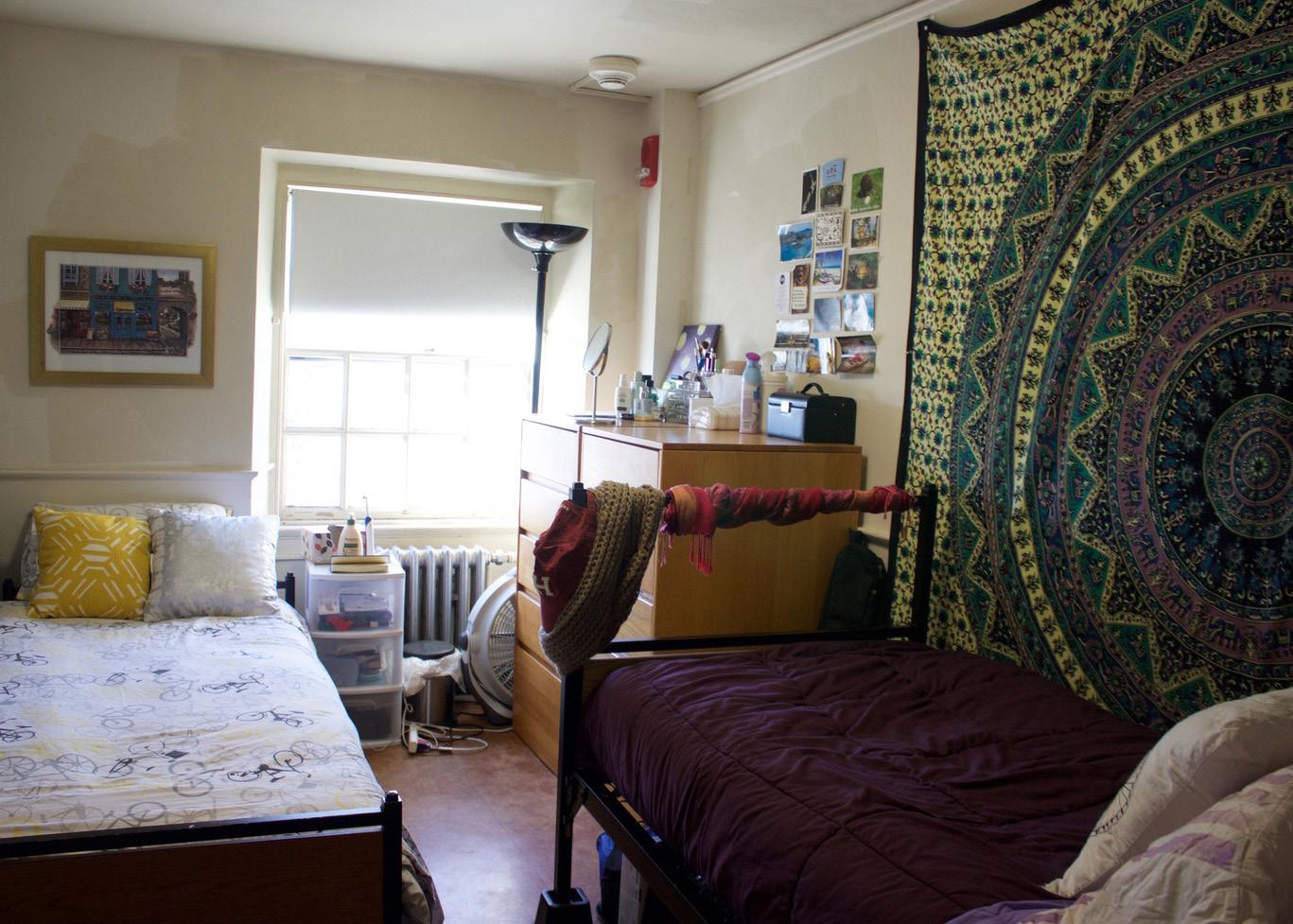
“Roommates really appreciate when you are proactive instead of reactive about things like the cleaning schedule, quiet hours and alarms,” Gupta said. Instead of taking a first-comefirst-serve approach to issues like room arrangements, consider alternative solutions, like rotating who gets to live in the single at the start of a semester. Your roommates may be totally different from you, but they should still work with you to resolve any problems that may arise. And if the vibe just doesn’t come together, don’t stress: your blocking group — the friends who join you in your upperclassmen House in sophomore year — can be entirely different.
Bonding
Like it or not, you’ll likely see your roommates first thing in the morning and last thing at night — so it’s a good idea to make a conscious effort to get to know them. Your roommates may not have the same sense of humor or personality as your friends from back home, but the least you can do is approach them with an open mind.
Dev S. Ahuja ’27 said while he was new to having a roommate, he found someone “whose lifestyles matched mine.”
“I was paired with someone that I was able to have late-night conversations with about academic and social struggles right from the beginning,” Ahuja said. Ahuja added that he and his roommate ate out at a restaurant in Harvard Square at the beginning of the year to get to know each other. Other time-tested bonding ideas include window shopping on Newbury Street, going to a movie at the AMC theater just a few miles away from campus, or taking a stroll in Cambridge Common. And if big trips aren’t your style, there are plenty of smaller, equally fun activities to enjoy together. Whether it’s grabbing coffee at Blank Street Cafe, having a game night in your dorm, or simply taking a walk around campus, there are countless
BY CAM E. KETTLES CRIMSON STAFF WRITER
The Harvard Corporation — the University’s highest governing body — officially appointed Alan M. Garber ’76 as Harvard’s 31st president, delaying an official presidential search until 2026. Garber, who was appointed interim president after Claudine Gay resigned from the position on Jan. 2, will continue in the role through the end of the 2026-27 academic year. He had previously served as University provost for 12 years, advising Gay and her two predecessors as Harvard’s chief academic officer.
Rather than embarking on a formal search for the next permanent president, the Corporation removed Garber’s interim tag and announced it would spend the next several months reviewing its presidential search process. The most recent presidential search — which has been widely criticized as too secretive — came under additional fire after Gay was accused of plagiarism.
It was also revealed that the Corporation had not reviewed Gay’s scholarship during the search process.
As the Corporation undergoes its review, Garber will effectively serve as a leadership stopgap. During his interim term, Garber was praised for his administration’s ability to peacefully end a 20-day pro-Palestine encampment in Harvard Yard. He also worked to mend relationships with donors and members of Congress, earning him a reputation for dimming the national spotlight on Harvard. Less than two weeks after Garber’s appointment, a second interim tag was dropped, and longtime Harvard Law School Dean John F. Manning ’82 permanently took on the provost role. Manning has been credited for leading the push for a University policy against issuing statements on political controversies, which was approved and adopted by Garber in May.

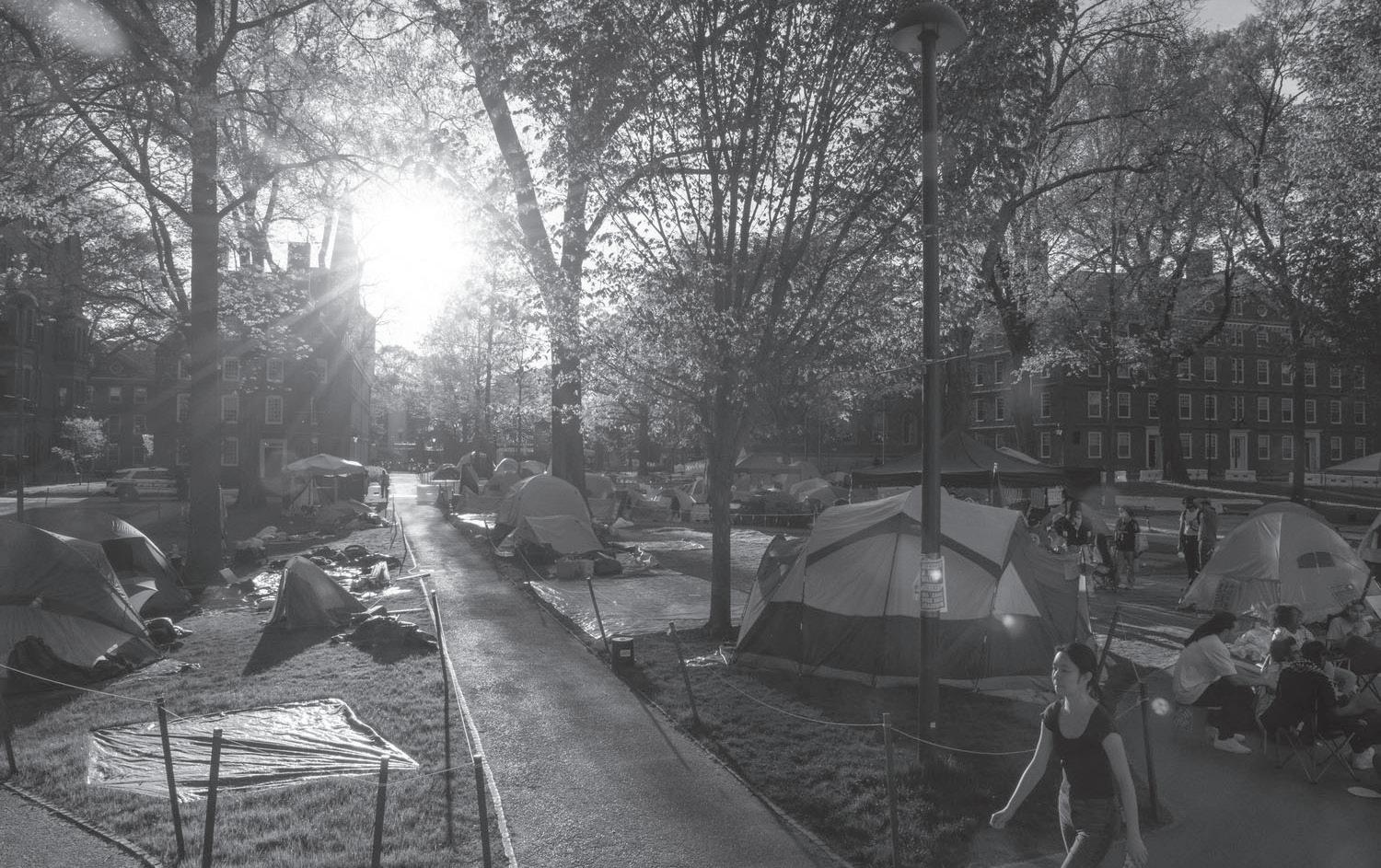
Harvard quietly reversed its most severe disciplinary actions in July against students who participated in the spring pro-Palestine encampment, granting degrees to 11 of the 13 seniors and reversing suspensions for all five students.
The change came just one month after more than 1,000 people walked out of Commencement over the 13 withheld degrees. The Corporation had initially declined to honor a vote by the Faculty of Arts and Sciences to add the students back to the list of degrees for conferral, citing that the students were not “good standing” due to their disciplinary status.
Then, the Harvard College Administrative Board — the body re-
sponsible for enforcing the College’s rules and policies, which had issued the original sanctions — reversed its most severe penalties following an appeal by the Faculty Council. The suspensions were downgraded to probations, probationary periods were reduced
in length, and 11 degrees were conferred shortly after. The remaining two students of the 13 will receive their diplomas when their probations end in December.
The reversals come as University administrators reevaluate their policies for discipline and protests. Harvard added the use of chalk and unapproved signage to the list of prohibited activities in campus spaces in July, building on protest restrictions put in place in January that prohibited protests inside University buildings and on walkways. While the rules have been repeatedly restated and clarified, it remains unclear which Harvard will choose to enforce in the fall.
In a major blow to the University, a federal judge denied Harvard’s motion to dismiss a lawsuit by six Jewish students alleging Harvard did not adequately respond to antisemitism on campus.
While the same judge, U.S. District Judge Richard G. Stearns, ruled to dismiss a similar lawsuit against MIT just one week prior, the Harvard lawsuit will proceed to discovery, where University administrators will likely be required to reveal more about its response to protests and approach to disciplinary action.
In the ruling, Stevens wrote
“in many instances” to an “eruption of antisemitism.” He dismissed a claim within the lawsuit that Harvard directly discriminated against Jewish Students, but cited the lack of disciplinary action as evidence that Harvard “failed its Jewish students.”
University spokesperson Jason A. Newton wrote in a statement that “Harvard is confident that once the facts in this case are made clear, it will be evident that Harvard has acted fairly and with deep concern for supporting our Jewish and Israeli students.”
The ruling comes weeks af-
dress antisemitism — alongside a task force to combat anti-Arab bias — released its initial recommendations. The group asked administrators to address “disturbing reports” of discrimination against Israeli or pro-Israel students and strengthen disciplinary processes. The report itself was immediately criticized by members of Congress and the lawsuit’s named plaintiff, Alexander “Shabbos” Kestenbaum, a 2024 Harvard Divinity School graduate. Kestenbaum called the report — which did not advocate for firing faculty or address diversity, equity, and inclusion
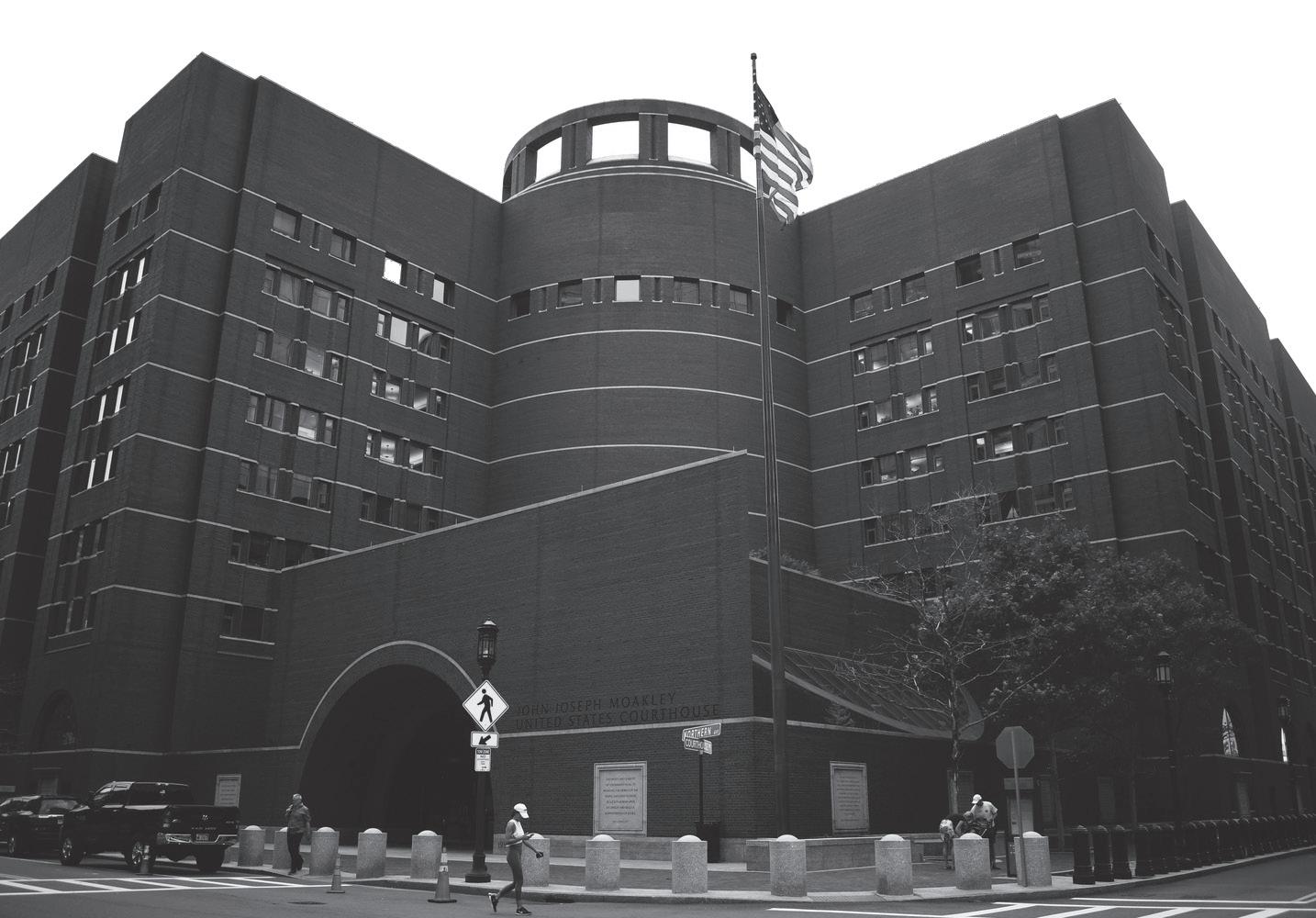
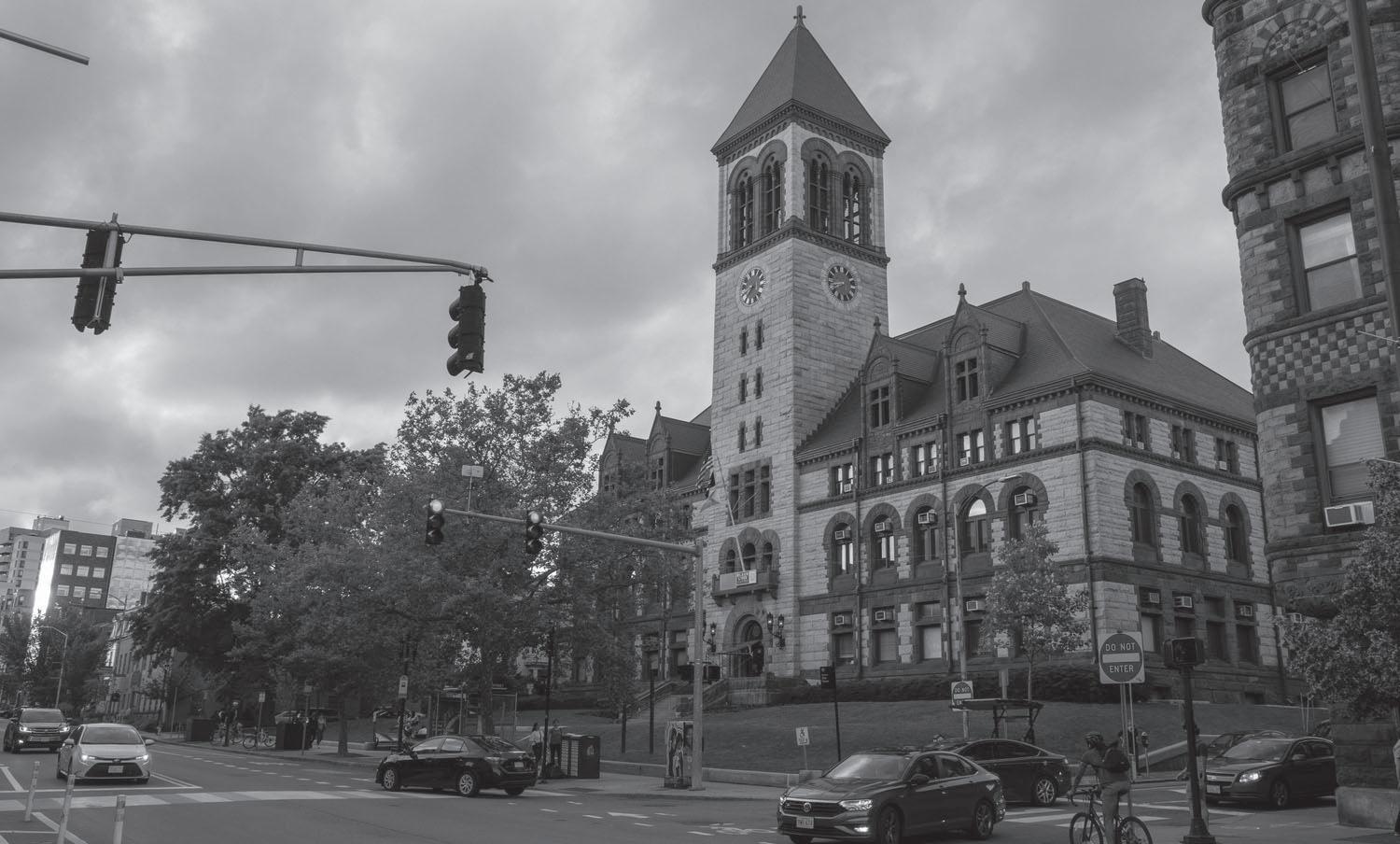
Two cyclists died after separate collisions with trucks on Cambridge streets in June, the first collision-related bicycle deaths in the greater Boston area since 2022. The two victims — Kim Staley, a 55-year-old Florida resident, and Min-Thi Nguyen, a 24-yearold Cambridge resident and MIT graduate — died in intersection collisions near Kendall Square and at the intersection of DeWolfe Street and Mount Auburn St. in Harvard Square, respectively. Both crashes involved trucks that turned in front of the cyclists, according to preliminary investigations by the Cambridge Police Department. Neither truck was equipped with side guards, a device designed to prevent pedestrians and cyclists from being caught under trucks in side-impact collisions. The deaths have ignited a new
wave of debate about cyclist safety on Cambridge streets. Cambridge Bicycle Safety Volunteer Chris A. Cassa, an assistant professor at Harvard Medical School, said measures to increase intersection visibility and slow vehicles could make the streets safer for cyclists. While DeWolfe Street and Mount Auburn St. has a bicycle lane separated by flex-posts, bike lane safety has long been a particularly contentious Cambridge issue. Though the Cambridge City Council had pledged to install 25 miles of separated bicycle lanes by May 2026, the project was extended by 18 months in April.
At a vigil for Staley and Nguyen, Cambridge resident Scott D. Cody said the deaths made him fear for his four children learning to ride their bikes.
“What if they lost me? Or what if I lost one of them?” Cody said.
Harvard students and alumni won eight gold, one silver, and four bronze medals at the 2024 Paris Summer Olympics, the most medals in University history. Twenty-six Harvard students and alumni traveled to Paris to compete for 10 countries, winning enough medals to tie the University for 12th place in gold if it had been entered as a country. Track and Field star Gabby Thomas ’19 won three gold medals in Paris, becoming the most decorated Harvard Olympian in history. Lauren S. Scruggs ’25 also shined at the Olympics, winning a silver medal and a gold medal in the two fencing events that she competed in.
MAKING THE GRADE. Learn the landscape of Harvard’s thousands of courses — and which ones are right for you.
BY AKSHAYA RAVI CRIMSON STAFF WRITER
For many Harvard freshmen, course registration is something straight out of a Robert Frost poem: two roads, or five roads, or ten roads diverging in a yellow wood, each representing a different way to design their fall schedule.
Although there’s no wrong way to “do Harvard,” a good schedule can make you excited to start the year – and that can make all the difference.
For Advice: The Q Guide
Not sure which history course is right for you? Debating whether that biology course with the compelling syllabus might be too much work? Turn to the Q Guide!
Since 1973, Harvard College has been collecting course evaluations on all courses, enabling students to find estimates on weekly workload, course support ratings, and comments from those who have taken the same class in prior semesters.
Be sure to check out the Q for every course you’re considering to make sure you aren’t taking on a workload that’s too heavy (or too light).
For Breadth of Study: Gen Eds
Harvard requires students to take one Gen Ed course in each of four categories: Aesthetics and Culture, Ethics and Civics, Histories, Societies, Individuals, and Science and Technology in Society.
Each category has a slate of unique options, and freshman year is the perfect time to take Gen Eds. Gen Eds give you the chance to explore a potential concentration or interesting subject while balancing an otherwise busy social and academic calendar, and are a good thing to get done early to help hone your interests.
For Going Deep: Freshman Seminars
With titles such as “#Adulting” and “Knowing Cicero,” freshman seminars provide incoming students with the opportunity to study a focused topic with leading professors in a small, low stakes environment. Classes are limited to 15 students — all freshmen — with an emphasis on discussion, and

are graded on a satisfactory/ unsatisfactory basis. It’s a great way to take a course with an expert without adding too much stress to your busy life.
For Expanding Horizons: Languages
Since 1968, Harvard students have been required to take a language class for two semesters. Here, you have your pick of approximately 45 languages — from Russian to Mandarin, from Urdu to German, you can study the world’s major languages or a smaller, more niche language here at Harvard. The difficult part, like picking any course, comes in deciding which to pursue.
For Acclimating Academically: Expos
Expos places students in small, discussion-based classes with several essay assignments, providing students with feedback and revisions so they are prepared for college-level writing in the future. All Expos courses are structured in one of a few ways, and are almost always all-freshmen. To satisfy the requirement, you will either take the one-semester Expos 20, centered around a specific topic, or you will take Expos Studio 10, a more general writing course followed by Expos 20 or Expos Studio 20. If neither of those options satisfy you, Harvard has one more option: students can replace their Expos requirement with two semesters of Humanities 10, a class famous for reading many of the world’s great books and discussing it every
week with many of Harvard’s top literature professors.
For Preparing Yourself: Pre-Reqs
It’s not too early to start considering possible concentrations and getting a start on some introductory courses.
Computer Science 50 and Economics 10a are two of the largest classes at Harvard and especially popular during freshman fall, with more than 600 students in each class every fall.
Large classes like these may seem intimidating at first, but with small 20-person discussion sections, they often feel much smaller. If you’re interested in economics or CS — two of Harvard’s most popular concentrations — it’s worth checking these out.
For students considering medical school later on, there are several required pre-med classes to take, and discussing how to fit these classes early on can set up your four years for success. For example, many pre-med freshmen will take Life Science 1a or Life and Physical Sciences A, two introductory biology courses, during the fall.
For Having Fun: Explore!
Given Harvard’s extensive course catalog — this year, you have your pick of thousands of courses at the College spread across 50 concentrations — your first year is the ideal time to bask in the many academic disciplines at your disposal. Don’t let it slip by! From a concentration in Chemistry and Physics (yes, both together!)
to a secondary in Translation Studies, Harvard offers a wide breadth of classes every semester, but the best time to explore is freshman year, while you are still determining your concentration and don’t have the pressure of completing requirements. At its core, Harvard is a liberal arts and sciences institution, with its biggest strength being an expansive set of classes taught by world-class faculty. College is the time to explore widely, and freshman year is the perfect time to take advantage of that gift! Refresh Canvas, doom scroll on my.harvard, and read way too many Q Guides – there is no way to do Harvard wrong, but the road you choose will make all the difference.
akshaya.ravi@thecrimson.com
Feeling bamboozled by Harvard College’s curriculum requirements? Wishing you went to Brown University instead, for simplicity’s sake? Here’s a breakdown of the classes you’ll need to check off your list before you graduate.
Searching for Courses
To see what requirements you’ve satisfied, you can download an advising report from the “My Program” tab of my.harvard. In the course search tool, you can use the “Search By My Requirements” filter to find classes that meet the requirements you have left.
As you browse courses on my.harvard, take a look at course syllabi and Canvas sites to get a sense of what they cover. Check out the Q Guide to see reviews left by former students — the Q tells you everything you need to know about how previous students felt about the course, the instructor, and the weekly workload.
Expository Writing
Every Harvard student is required to take a writing seminar:
you’ll be placed either into Expos Studio 10 or Expos 20. Expos 20, a one-semester course offered in both the fall and spring semesters, is designed to teach college writing skills. Each section is focused on a topic: anything from scams to science visualizations to queer coming-of-age stories. Expos Studio 10 is designed for students who have less experience with academic writing. The sections are smaller (a maximum of 10 students, rather than 15), and the class focuses on workshopping writing techniques. Expos Studio 10 is offered only in the fall semester, and students who take it can choose between taking Expos Studio 20 or a regular Expos 20 course in the spring. If neither seem right for you, there is a third option: the two-semester Humanities 10 sequence. This course is often described as a “book club,” with each week focusing on different famous texts ranging from Homer and Plato to René Descartes and Virginia Woolf. Hum 10 is intense — as the Q guide will warn you! — but many students find it rewarding. Make sure to stay on top of your deadlines: the Hum 10 application closed at 11 a.m. on Aug. 22, and the fall Expos lottery closed at midnight on Aug. 27. If you meant
to fill out one of those forms and didn’t get the chance, now’s the time to reach out to your adviser.
Quantitative Reasoning with Data
You can fulfill your one-semester QRD requirement at any point in your four years here, but many students knock it out in freshman year. Your placement test
Any student who hasn’t already fulfilled their language requirement upon arriving at Harvard must take eight credits — generally, two semesters — of a single language.
score will determine what intro math class Harvard advises you to take. Placements include Math MA (combined precalculus and single-variable calculus), Math 1A (single-variable calculus), and Math 1B (the sequel to 1A). If you receive a higher score, you’ll be presented with a range of options, because the place -
ment test doesn’t distinguish between higher-level math courses. Instead, you can choose between them based on your interests. Math 18 and 19 teach multivariable calculus and are geared toward its applications in the social sciences and the life sciences, respectively. Math 21, 22, 25, and 55 each include one semester of linear algebra and one of multivariable calculus. The higher the number, the more abstract (and time-consuming) the class. If you’re a seasoned math nerd, though, be careful: Neither Math 25 nor Math 55 fulfills the QRD requirement. Not a math fan? Fear not: students can take quantitative courses in a range of departments to satisfy the requirement, like Economics 50: Big Data in Economics, Statistics 110: Introduction to Probability, or even Astronomy 2: Celestial Navigation.
Languages
Any student who hasn’t already fulfilled their language requirement upon arriving at Harvard must take eight credits — generally, two semesters — of a single language. From Armenian to Yiddish (and tutorials in Zulu), you have plenty to choose from.
You’ve already fulfilled the requirement if you scored 5 on an AP exam or 7 on a Higher Level IB exam in a language other than English, or if your high school education was in a language other than English. If you score high enough on a language placement exam (many are offered at the departmental level), you can test out of the requirement as well. Even if you’ve already satisfied the requirement, Harvard offers instruction in languages that span the world. Try something new!
General Education
Every Harvard student must take four Gen Ed classes, including one from each of four fields: Aesthetics and Culture, Ethics and Civics, Histories, Societies, Individuals, and Science and Technology in Society.
Gen Eds are usually large lecture courses with lab or discussion sections. Some have enrollment caps, so make sure to keep an eye out for those lottery deadlines! Well-known Gen Eds offered this year include Sleep, Happiness, Global Japanese Cinema, The Ancient Greek Hero, and How to Build a Habitable Planet, just to name a few.
Many students recommend spreading Gen Eds throughout your time at Harvard, rather than taking them all in one semester. Many Gen Eds will also satisfy requirements for your major, whatever it may be, so be sure to check the requirements for concentrations you’re interested in. You may get a two-for-one deal!
Distribution Requirements
Before you graduate, you’ll have to take one class in each of the Faculty of Arts and Sciences’ three divisions: Arts and Humanities, Social Science, and Science. In lieu of a class in the Science division, you can also opt for a course in the School of Engineering and Applied Science. If you take courses in different departments, you may well satisfy most of this requirement without even trying to.
Harvard’s course requirements might take you outside your comfort zone, but they’re also a chance to discover new interests, build a solid foundation in your discipline, and cultivate knowledge and methods beyond your chosen field. You have four years at Harvard; explore widely!
EXTRACURRICULARS.
Don’t be put off by Harvard’s hundreds of student groups — there is something for everybody.
BY ARAN SONNAD-JOSHI AND SAKETH SUNDAR CRIMSON STAFF WRITERS
Harvard has so many student groups — more than 400 — that it can be surprisingly difficult to figure out which ones actually interest you. But before you check out the hundreds of tables at Harvard’s club fair on Sept. 6, here’s The Crimson’s guide to some of campus’s most popular organizations. At least you can pretend you have it all figured out.
Want to nab a summer associate position at McKinsey and spend your life PowerPoint-ing your way to the top? Then the Harvard Undergraduate Consulting Group and Consulting on Business and the Environment are the place for you! Join a community of students perfecting their LinkedIn profiles, practicing their handshakes, and working with real-world business clients on their real-world business problems. The blowout formals are just a perk.
If you’re looking to make a little cash, join Harvard Student Agencies where you can learn to run actual businesses like The Harvard Shop or welcome tourists to campus as a tour guide.
PBHA
The Phillips Brooks House Association is your go-to for all things community service at Harvard. Whether you’re teaching elementary schoolers, tutoring kids, supporting the homeless, or working with the elderly, PBHA offers dozens of programs that let you dive into meaningful work while hanging out with other students who are equally eager to do good.
PBHA also helps run Harvard’s Global Day of Service, which takes place this year on Aug. 30. Grab a free t-shirt and use the opportunity to give back and get a taste of one of Harvard’s most well-known organi -
zations.
Affinity Groups
Harvard’s wide range of affinity groups provides students with spaces to find solidarity and a sense of belonging in a large, often overwhelming campus environment.
Organizations like the Asian American Association, Harvard Fuerza Latina, and the Harvard Black Students Association host events ranging from cultural performances and social gatherings to speaker panels and networking opportunities. These groups also create platforms for students to discuss important issues affecting their communities.
Affinity groups at Harvard can also be about building support networks. The Harvard College Queer Students Association provides a home for LGBTQ+ students to connect and find support, while Harvard Primus focuses on supporting students from first-generation and low-income backgrounds. Religious students looking to connect with like-minded classmates can join groups like the Harvard Islamic Society, Harvard Dharma, or Harvard Hillel, while the Harvard University Disability Justice Club offers a platform for students advocating for accessibility.
Performance
If you enjoy being in the spotlight, Harvard also has several groups dedicated to the performing arts. The Harvard Radcliffe Modern Dance Company, the Asian-American Dance Troupe, and the Harvard Ballroom Dance Team are just a few of the dance organizations on campus while the Harvard-Radcliffe Dramatic Club and the Hasty Pudding Institute of 1770 allow students to embrace their theatrical side.
Another touchpoint for the arts is Eleganza, the annual student-run showcase of fashion and dance that is known to leave many students, in their own words, gagged. And if you find yourself more musically inclined, Harvard boasts a wide array of both orchestral and vocal groups including the Harvard-Radcliffe Orchestra, the Harvard Glee Club, and the Kuumba Singers
Since 1636, generations 0f Harvard freshmen have sought the answer to an age-old question: what’s the move? Moreover, with whom should I pursue it? You just moved away from home, and socially, it’s time for a fresh start.
Some have called Harvard’s social scene dry, lackluster, even dead — but rumor is, the class of 2028 may be here to change that.
While nothing can top The Crimson’s news comp when it comes to accruing social capital, here’s some sage upperclassman advice on crafting your social calendar until at least Halloweekend.

of Harvard College. For singers, seek out the Dins and Tonics, the Opportunes, or the Krokodiloes for a shot at TikTok fame.
Government
The Institute of Politics is Harvard’s official factory for churning out future politicians. You’ll get to work on policy at a national level, promote civic engagement, and learn to throw around phrases like “coalition-building” in casual conversation. As the election approaches, consider some of the more popular IOP programs, including the JFK Jr. Forum and the Harvard Votes Challenge.
If practicing debate and diplomacy overseas is more your jam, Harvard’s got that covered as well. With Harvard Model United Nations (HMUN), Harvard United Nations-Foreign Policy Initiative (HUFPI), and Harvard Model Congress
First things first — connect early on with your pre-orientation groups, entryway, and suitemates.
“Establishing a good relationship with your roommates is a really good way to get started as a freshman, because they’re really built-in friends for you,” Hayden Graham ’26 said.
“I did FOP, which was one of the better springboards into
(HMC), you can travel the world to debate global issues, simulate politics, analyze foreign policy, and world affairs.
Publications
We might be biased but, if you’re interested in any aspect of journalism — from hard-hitting news coverage to photography and podcasting to business operations — come down to 14 Plympton Street and join one (or more) of The Crimson’s 10 boards. The Crimson is the oldest continuously published daily college newspaper and our alumni include two U.S. presidents and many academics, journalists, and politicians. Seriously, it’s a great time.
For budding researchers, Harvard also boasts a number of publications for academic and opinion writing, including the Harvard Political Review,
having some friends or some people you’re familiar with on campus,” Taj S. Gulati ’25 said.
And don’t ignore the potential of finding friends in the odd section or during office hours either.
Charisma W. Chen ’26 said frequenting academic spaces, like Cabot Science Library, led her to meeting some of her best friends.

the Harvard Science Review, the Harvard Undergraduate Law Review, and the Harvard Review of Philosophy.
If you’re more interested in literature and art, consider joining the Harvard Advocate, with a quarterly magazine that features fiction, poetry, and art. And if you consider yourself funny, there’s always the Lampoon, a semi-secret Sorrento Square social organization that used to occasionally publish a so-called humor magazine. But you’re probably better off in Lamont.
Hobbies
Harvard’s got a club for even the most quirkiest hobbies. The Harvard Undergraduate Beekeepers are literally out there tending hives on campus. If you’d rather avoid potential bee stings, the Harvard Knitting
“Go to Cabot at night to socialize, because most people aren’t doing their work a lot of times anyway,” Chen said.
At mealtimes, fill the high ceilings of Annenberg Hall with laughter as you forge new connections waiting in line for a Veritaffle. And from 9-11 p.m. from Sunday-Thursday, return to the dining hall for extra latenight bonding at brain break.
Kritika Nagappa ’26 said she would spend hours in the cafeteria, having “meal on meal on meal.”
“That was the best way, just because you were sitting with so many rotating faces,” Nagappa said.
According to Chen, extracurricular activities are another tried-and-true way of making lasting friendships in college.
“Comp as many clubs as you can,” she said. “Having the opportunity to explore, I think that’s something unique to your freshman year.”
Kyra S. Siegel ’25 encouraged students to adopt a yes-mentality to maximize campus exploration opportunities.
“Go to the panels and go to the little club meetings and the food markets,” Siegel said.
“Do what you can to get a slice of life,” she added.
Once you’ve solidified some new friendships, deepen your connections by exploring Harvard’s party scene together — whether in the basement of Tasty Burger or the Mather Junior Common Room, you’re guaranteed a core freshman year memory.
next level, the Harvard College Magicians Society might even teach you how to make midterms disappear. If only that were a real trick. There’s probably a club for almost anything you can think of at Harvard. The variety can be overwhelming, but don’t be scared. Take in the hundreds of posters at the club fair, talk to upperclassmen, and attend intro comp meetings as you try to find your extracurricular passion. And of course, if you truly can’t find a group for something, you can always grab some friends and make it yourself (as soon as Harvard lifts the ban on new clubs).
aran.sonnad-joshi@thecrimson.com
saketh.sundar@thecrimson.com
Keep an eye on extracurricular group chats and club leaders’ Instagram stories to stay in the loop about weekend events. But it’s okay not to meticulously plan your rager itinerary, according to Gulati.
“Honestly, the move will find you,” he said. At first, most party experiences will be hit or miss — but Thor N. Reimann ’25 said that shouldn’t deter you from attending.
“You’ve got to experience the misses yourself, or else you don’t know how good the hits really are,” Reimann said. If you’re not one for sweaty crowds and late nights, don’t worry. You can always ensure you’re in bed by 11 by hosting your own party.
“If you’re worried about not being invited to things, feel free to just host your own,” Graham said, adding that taking things slow might be the best approach during your first semester.
“If you’re more of an introvert, that’s OK as well. You don’t have to be a completely new person in college,” he said. Because, at the end of the day, quality over quantity is essential.
“Be comfortable with the fact that even if you feel like you only have one or two close people at school, that’s way greater than having a ton of friends that you know loosely,” Nagappa said.
In an ordinary year, for a brand-new freshman, Harvard’s reputation precedes it. After this extraordinary one, we have to imagine it’s inescapable. Your new university matters to a far larger group of people across the world than will ever know it firsthand, and as such, what you’ve heard about it — in movies, in the news, from your great aunt or your dad’s coworker — is at best a sketch and at worst a caricature.
Because we know firsthand how little what people say about Harvard sometimes corresponds with the reality of attending it, we have asked the members of the Editorial Board to share their reflections on Harvard this past year and the discourse surrounding it. Their reflections won’t necessarily match your eventual experience either, but we think they offer something a good deal better than what you’ve seen or heard thus far.
–Tommy Barone ’25 and Jacob M. Miller ’25, Editorial Chairs ***
Outside of the media spectacle that paints Harvard’s campus as a tumultuous, perpetually chaotic space, my reality has shown me the opposite. Here, respectful conversations, cross-cultural understanding, and exploration are my daily reality. Here, I’ve found myself more understood than at any other point in my life. Without a doubt, there are people I disagree with here. There are times where my friends and I have not felt the most welcome or included. At times, such interactions have filled me with genuine dread, dissatisfaction, and sometimes anger. But that’s life — it is not a distinctly Harvard phenomenon and never will be.
To the Class of 2028, I say keep an open mind. You already enthusiastically applied to Harvard in the midst of a particularly volatile time for the University. As you begin your journey here this fall, my message to you is simple: continue your faith.
–Jasmine N. Wynn ’27, Crimson Editorial editor
This might be a shock to the media, but not every conversation at Harvard is about the Middle East, or anything academic or political for that matter. We’re literally college students.
Freshmen, college is not a place for “winning” arguments with your peers. If you’re into that, join the debate team. College is a unique chance to live with, learn with, and laugh with people who bring different backgrounds, ideas, and skills to the table.
We’re not supposed to all agree, and not one of us has all the answers. In conversations in Annenberg, tutorial, or your entryway stairwell, you’re allowed to lay down your sword and shield.
That doesn’t mean you shouldn’t surround yourself with people who share your values, and approach your conversations critically. But it’s possible to talk with someone about issues you care about, listen, disagree with them, and then share a beer and crack jokes with that person over the weekend at a party. Trust, respect, and friendship make disagreement in conversation more fruitful and constructive. Try it sometime.
Matthew E. Nekritz ’25, Associate Editorial editor
–
When the actions of a few turned Harvard into a one-dimensional monolith in the public discourse, students and faculty continued doing what we do best — carrying on in our unwavering pursuit of knowledge. In the news, you see the extremes, and it’s easy to forget the quiet voices of reason in the middle. We are students and scholars first. While the media focuses on divisive slogans and sensational imagery, Harvard remains a place where diverse perspectives coexist and thrive. This past year, we slowly learned to tune out the exasperating extremes — we kept listening and debating with an open mind as we sought to nuance our understanding of issues that were never black and white. We are all part of this beautiful, supportive, and, yes, imperfect community we call Harvard; despite the spotlight, remember to always cherish the little things that make it home, from impromptu philosophical debates in Annenberg to late-night walks through the Yard.
–Rohan Nambiar ’27, Crimson Editorial editor
For all the ink spilled over it in the past year, you’d hope our formulation of the problems with open and critical engagement on campuses and in the nation would have improved apace. Unfortunately, I don’t think it has. When its colleges enter the headlines, it seems to me that America’s thought leaders, professors included, behold them with cloudy eyes. Whether because of generational anxiety or political motives or something else altogether, pundits see rancor on campuses, shout ‘cancel culture’ or ‘wokeness,’ and perhaps point to a favored cause — social media, say, or participation trophies — with precious few specifics. Moderating tough discussions as editorial chair and participating in them as a student and citizen, I’ve experienced much that disconfirms these analyses. Very few Harvard students are out
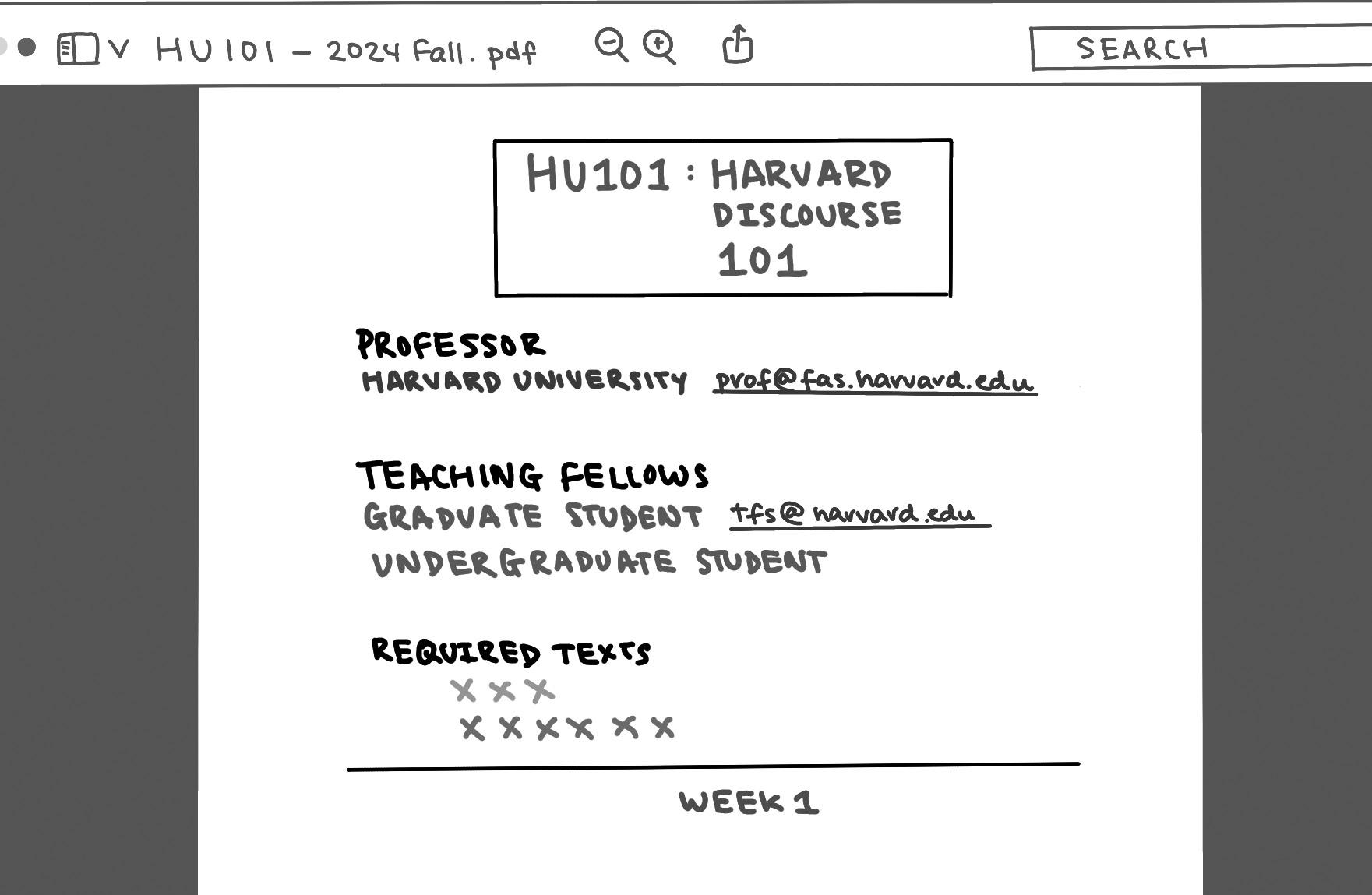
to cancel you. Nobody’s live-blogging your discussions. Most are left of center but not far beyond it, and they respect views right of theirs.
In other words, you might feel uncomfortable sometimes expressing divergent opinions, but you’re almost certainly not going to get canceled. So, freshmen, I have two pieces of advice: When speaking, brave the discomfort; and when listening, do your very best not to cause it in others.
Tommy Barone ’25, Crimson Editorial Chair
–A magnifying glass has been put on Harvard for months when it comes to protests, faculty disputes, and campus unrest, but our loudest critics fail to mention the togetherness and school spirit that shine through in events like Housing Day. Our turmoil has been in national headlines, but our joy has been lost in all of the noise.
–Hailey E. Krasnikov ’25, Crimson Diversity and Inclusion Chair
Despite media hysteria, Harvard is a place that I feel comfortable calling my home. More than that, it is a place where disagreement, debate, and argument are welcomed. There have been many times where I have gotten into disagreement, often heated ones, with classmates, friends, and neighbors. Never have I felt like my speech has been stifled, nor have I felt unable to express my opinion.
I have been able to find community and safety within Harvard’s aged walls: people that I am at home with and feel comfortable talking to when things are difficult, that I feel compelled to bounce ideas off of, and whom I respect. No matter what the news or politicians like Rep. Elise M. Stefanik ’06 (R-N.Y.) will tell you, you can find a home at Harvard College.
Vander O.B. Ritchie ’26, Crimson Editorial editor
–
The media coverage we received last year was inflammatory and divisive. It was also blown far out of proportion.
Don’t get me wrong, plenty of people protested, posted on social media, and held rallies. Yes, their words and actions were provocative. But, in my experience, they do not constitute the majority of Harvard students.
As I saw it, most people pretty quickly learned to tune out the noise coming from both within Harvard and without. We cared more about getting to class, finishing our psets, and writing our papers than whatever was dominating the news cycle for the day. We were more interested in hanging out with our friends, going to our club meetings, and catching up with people in the dhalls than finding something to be upset about.
So please, don’t be fooled by what you see on the news. Shockingly, it reflects the experiences of the extremes, not the majority in the middle. –
Henry P. Moss, IV ’26, Crimson Editorial editor
Harvard’s still quite a lot of fun. Despite all the gloom and doom (and truly serious issues you’re meant to have conversations about), you’re still in a place that was designed to teach you while giving you a great time, and whatever you think about the ethics of this, it has quite a lot of power to do so. Enjoy!
–Ivan Toth-Rohonyi ’25, Associate Editorial editor
While some outside the gates paint Harvard as a chaotic, hyper-progressive, and monolithic campus, they have mischaracterized our student body. My classmates engage in peaceful dialogue, learn from each other, challenge our beliefs — all in line with the mission of intellectual freedom and vitality. The media is correct that we face issues — antisemitism, anti-Palestinian sentiment, leadership uncertainty — but what is missing is our uni -
ty. More brings us together than divides us. While we all hail from different backgrounds, we are united in our journey to use our education for the common good.
Moving forward, it is important we recognize that while many students may disagree on the critical issues facing our campus, a public policy disagreement should not equate with hating one another. We must learn to disagree better, to engage in stronger dialogue, to make good faith attempts toward constructive conversations. It’s time to prove the critics wrong.
M. Austen Wyche ’27, Crimson Editorial editor
–Last year was a lesson in listening. Disagreement required a commitment to really hear people in order to respond meaningfully to their words. I wish my advice was more original or compelling, but like others have written: conversation is not a competition. Listen, pause, and take a moment to think before you speak.
– McKenna E. McKrell ’26, Associate Editorial editor
With the media frenzy that has consumed Harvard, it is tempting to view campus life in black and white. It would be easy to yield to national narratives about our University and designate it as either perfect or irredeemable.
Harvard is neither. Yes, it is a site of bitter disagreement between students. It is also a site of overwhelming support and understanding between students of vastly different backgrounds and ideologies. Yes, it is a place where one can silo themself into their preconceived notions about the world. But it is also a place where one can challenge themself to truly listen to the thousands of new peers they find themself among and learn something.
Class of 2028, be brave and open-minded enough to recognize that Harvard exists in shades of gray — be braver when you choose which shade of Harvard you will contribute to for the next four years.
Layla L. Hijjawi ’27, Crimson Editorial editor
–
Harvard is many things: a storied site of learning, a battleground for ideas that shape national politics, and, in some ways, a hedge fund. Grappling with Harvard’s contradictions isn’t easy. Yet, I’ve realized that defining Harvard is essential to being here.
Beyond the media headlines, one learns that despite its issues, Harvard remains an incredible place to be a student. Awaiting you is an incredible education, a vast array of intellectual pursuits, and a campus alive with debate and dissent. It’s impossible to engage this school without having ideas, beliefs, and theories both challenged and enriched. Here, we have a unique opportunity to grow as individuals by confronting the moral questions of our time and exploring the vast fields of human knowledge.
Remember, Harvard’s difficulty isn’t consigned to academics. It is a place of moral, political, and mental rigor. But it’s precisely these challenges that shape its students into leaders.
Zakiriya H. Gladney ’27, Crimson Editorial editor
–
Harvard has and will continue to make history. It’s almost inevitable. Your decision to remain active or passive, to engage in empathetic understanding or divisive discord, to make headlines or spend your time reading them will change the way you experience these next four years. Regardless of where you stand on any hot campus issue, be sure to recognize the power you wield as a bright, young student. Follow what is truly within your heart and realize that others are trying to do the same.
–
Julia S. Dan ’26, Associate Editorial editor
As the media has pointed out, discourse on campus routinely fails. Harvard, too, has taken note, rolling out various working groups and initiatives to study and remedy the problem. But there has been little attention given to the most obvious impediment facing discussions of controversial issues at Harvard: lack of education. It is no wonder that rhetoric about the Israeli-Palestinian conflict is so simplistic when so many students have not visited the region or read up on its history. And it is quite natural that political discussions break down when neither side has made a good-faith effort to understand the other. This is not to say that one must be a complete expert on any issue in order to have an opinion. Nor to suggest that there aren’t affiliates who have well-informed views on contentious topics. My point is simply this: In order for discourse to be productive, in order for it to provide educational value to those involved and to onlookers, it must be dominated by individuals whose views are well-substantiated and informed by fact. So, to the Class of 2028: If you have deep knowledge about a topic, please share it with your peers; if you don’t, there’s no harm in just listening.
–Jacob M. Miller ’25, Crimson Editorial Chair
As my peers rightly note, an oft-unspoken truth about Harvard students is that we are still just that — students. Lack of coverage is not proof of nonexistence, and much of our time is spent in “normal,” less-than-newsworthy ways. We study for hours in the library. We go out on weekends with friends. We pick up the mail and take out the trash. But there’s another truth missing, too. Though the protests and controversies of the last year were unprecedented in many ways, they were “normal” in many others. Harvard brings together some of the brightest minds from across the globe — this isn’t the first time we’ve seen campus discourse erupt in response to geopolitical or sociopolitical events. Indeed, it is difficult to imagine anything more “normal” for a Harvard student than to ask difficult questions, to voice and debate contentious ideas, and to engage consistently and critically in important conversations.
–E. Matteo Diaz ’27, Crimson Editorial editor
Most of what I read about Harvard this year missed the mark. Major newspapers latched onto decontextualized clips and administrative edicts to produce funhouse-mirror accounts of campus events. Journalists who spent as much time at the University as an average tourist displayed a similar familiarity with the contours of campus discourse. But interspersed within the outsider punditry was genuinely incisive analysis of the events of the last year — mostly coming from behind Johnston Gate. Some professors offered perceptive, firsthand accounts of last year’s leadership crisis and the Harvard Yard Encampment. Our Editorial Board weighed in thoughtfully as well. To the Class of 2028: Lots of people talk about Harvard. Don’t forget to speak for yourselves. –Saul I.M. Arnow ’26, Associate Editorial editor It’s disheartening to step into a conversation and feel as if every point you make is dismissed and overlooked. It’s as though the person you’re engaging with is simply waiting for their turn to speak, turning the dialogue into a monologue — like you’re being lectured rather than truly listened to.
Blaming others for this behavior is often really easy, but it’s harder to confront that you might be guilty of doing the same. Genuine dialogue with those who hold different ideas and beliefs can be incredibly rewarding, if only you’re willing to listen.
Sidnee N. Klein ’25, Crimson Editorial editor
–
Divinity School Volleyball Court
Whether you find yourself strolling up Oxford Street or getting lost on your way to Lowell Lecture Hall (which is in fact different from Lowell House), be sure to check out the Divinity School’s secluded sand volleyball court when you have some free time.
It might take some time to become accustomed to the layout of Harvard’s freshman dorms, upperclassmen houses, and classroom buildings, but before you know it, your daily wanderings may start to feel a little mundane.
But fear not: our centuries-old campus has no shortage of interesting places to have a picnic, do your readings, or simply walk around and explore. Here are some “hidden gems” around Harvard that are often overlooked by the everyday passerby. Whether you’re in an explorative mood or just really need a breather, be sure to check them out!
Quad Lawn
As Housing Day approaches in the spring, you might shudder when anyone mentions the Radcliffe Quadrangle, home to three upperclassmen Houses and located about one mile from Harvard Yard. Still, you shouldn’t shy away from checking out this part of campus as soon as you can. The Quad Lawn is an expansive, outdoor lawn resembling a football field, located just behind Cabot House. Before the weather gets too cold — or if you get ‘quadded’ on Housing Day — come here to bask in the sunshine, play games with friends, call your parents, or anything in between. This vast green space is a natural oasis in the heart of residential Cambridge.
A short walk away from the Northwest Building and the Peabody Museum of Archeology and Ethnology, the large volleyball court is located in a private courtyard surrounded by the Biological Laboratories. If you’re not interested in showing off your volleyball skills, this area is still a great place to come with friends, whether to picnic, play spikeball, or study when the weather is nice.
Cronkhite Courtyard
You wouldn’t necessarily think of the Quad’s overflow housing — the Cronkhite Center on Brattle Street — as a picturesque getaway. But Cronk residents know that next to the dormitories lies a quiet and well manicured grassy lawn that is well worth a visit.
In this green space, you’ll find scattered tables and chairs, although this isn’t the spot for a big group hang. Come here for some quiet reflection on the beginning of your four-year journey at Harvard, or for a nap and to get your fill of Vitamin D when spring rolls around. You might even catch a glimpse of the admissions officer who considered you a good fit for Harvard, as this little cove is right next to the Harvard Admissions and Financial Aid Office.
Radcliffe’s Sunken Garden
If even Cronkhite is too crowded for you, venture across Cambridge Common to the sunken garden next to Radcliffe Yard,

a short walk from most of your freshman dorms. Featuring a fountain, benches, and lush green life, this garden between Radcliffe Yard and the Graduate School of Education serves as a quiet place to study, talk, or meditate farther away from campus. If you’re looking for a great place to relax and find tranquility, this is the place to be.
Adolphus Busch Hall Garden
Among the more hidden of these hidden gems, Adolphus Busch Hall houses a beautiful
walled garden and terrace nestled inside the Center of European Studies. Whether stumbling across the hall while exploring campus one day or visiting for a class, it is absolutely necessary to take a moment to explore the walled garden. Greenery covers the walls around paneled arched windows which almost serves as an ornament for the building. Grab a coffee and enjoy the combination of beautiful architecture and attractive greenery.
Kennedy School Courtyard
versation with a friend.
When you enter the Harvard Kennedy School campus, you will be greeted by large patches of grass and trees. The courtyard, with a distinct location at the center of the HKS campus, is easily noticeable inside of the Kennedy School. Whether you are attending an event from the school, an Institute of Politics organization meeting, or more, the courtyard is a well-crafted space to take a moment for yourself before going into the campus itself. On a sunny day, you’re bound to see graduate students chat-
ting on chairs and tables in the courtyard. It is also a great place to eat food from the HKS cafe, where you can use your board plus to buy fancy pizza
or delicious rice bowls. But what really makes a “Hidden Gem” on campus is your own journey with a space — being able to explore Harvard’s campus allows you to find an area that best fits your needs — giving you the opportunity to
friends inside Harvard’s firstyear dining hall. Or, during midterm season, Brain Break at Annenberg can be a quick pit stop on your way back to a library or your dorm room for a late night grind.
Lamont Library
Though you might hear upperclassmen speak with dread about having to go to Lamont, fear not: this 24-hour library, with its quiet nooks and crannies, is the ideal location to lock in for a productive work session no matter what time of day it is. Whether you’ve procrastinat-
ed on your Expos paper or need to knock out some readings or a p-set by yourself, take a short walk to Lamont in Harvard Yard to get back on track. If you find yourself in Lamont sometime between 3 pm to midnight on Sunday through Thursday, be sure to check out the Lamont Cafe, where you can use your BoardPlus on a variety of drinks and snacks and socialize with friends away from Lamont’s quiet rooms.
Cabot Science Library
Located just inside the Science Center, the Cabot Science Li-
brary is a cozy place to study or even make new friends.
You’ll often find yourself in Cabot either in between classes in the Science Center or late at night, as the library is open 24 hours on Tuesday through Thursday before closing at 10 pm on Friday and Saturday. Each of Cabot’s three different levels offers something different — if you’re looking for a private room for individual or group study, head downstairs to the basement floor. The main level, with its long tables, sofas, and large meeting rooms, is a wonderful place to collaborate on a class assignment or share a con-
Upstairs, the vibes are more cozy and quiet, with plush sofas and tables making this floor of Cabot the ideal location to get in a productive work session. Just don’t mistake it for Cabot House — a dorm for upperclassmen in the Quad!
The Student Oasis
If you want to stay central in the Yard, but are looking for a change of scenery from the typical study session in Cabot or Lamont, The Oasis — located underneath Memorial Church and right next door to Canaday — is a great, but
often overlooked option. Oasis is especially desired if you’re looking for the moderness of Smith Campus Center, without the same amount of foot traffic coming in and out. A small, yet warm and plush location to study, The Oasis also contains a kitchen space if you’re looking to bake something or simply take a study break.
Langdell Hall
If you’re looking for absolute qui-
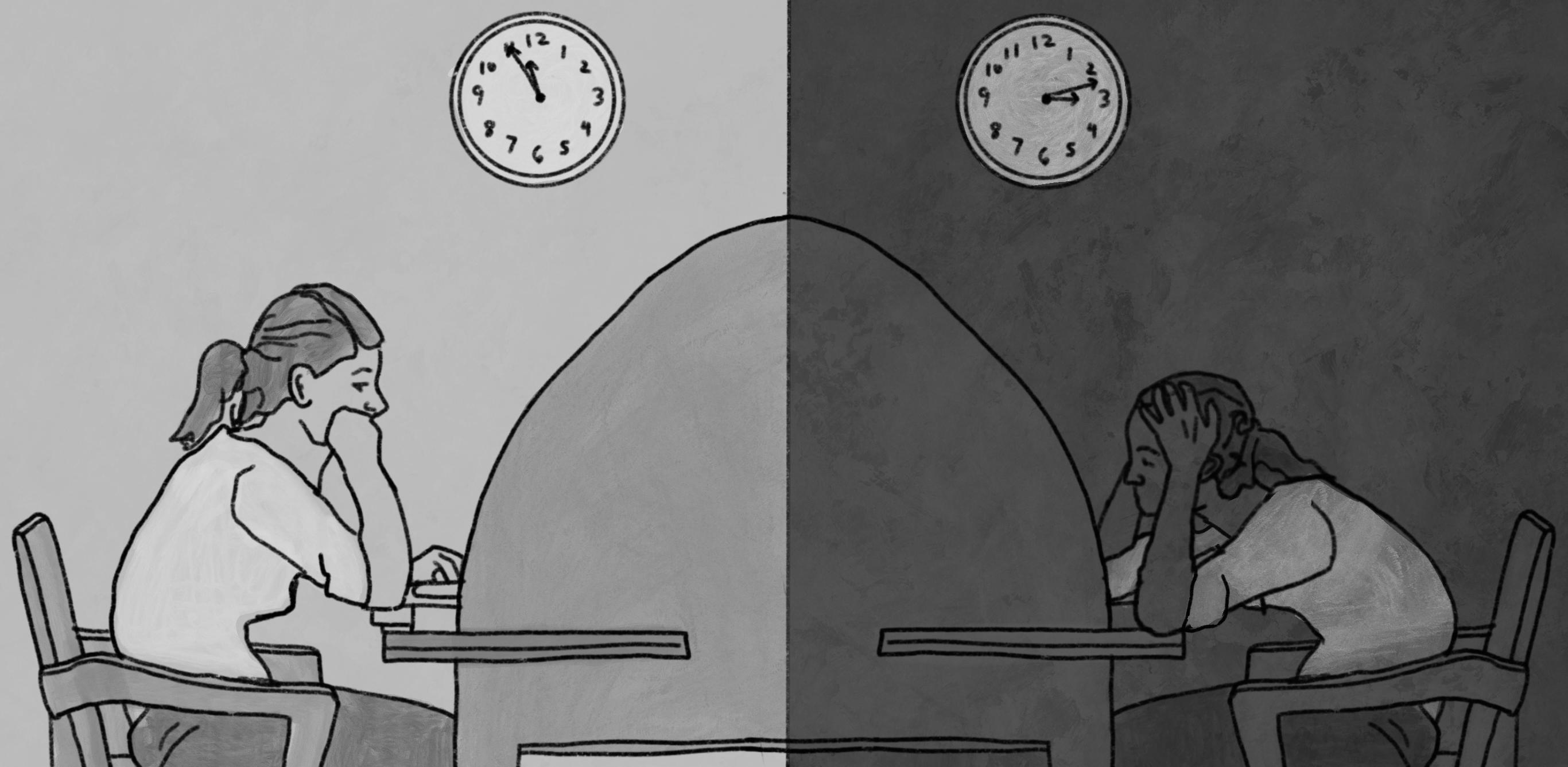
While the view of Annenberg Hall’s stained glass windows never gets old, it also never hurts to venture outside the realm of Harvard University Dining Services to spice things up by exploring the restaurants of Harvard Square.
Sweet Escapes
Whether you’re celebrating a midterm victory or escaping p-sets and essays, Harvard Square has you covered.
“I love to get sweet treats after exams with friends,” said Olivia Pan ’27. “It’s a great way to destress and rewind.” In the ice cream department, BerryLine offers a range of toppings as well as frozen yogurt and smoothie options, while Honeycomb Creamery near the Radcliffe Quadrangle serves unique, seasonal flavors.
Amorino crafts flower-shaped gelato or, for something simpler, JP Licks and Ben and Jerry’s both deliver classic New England ice creams. Craving something warm? Grab late-night cookies at Insomnia Cookies, savor waffles at Zinneken’s, or try Mike’s Pastry’s iconic cannolis. Donut lovers can enjoy artisanal delights at Union Square Donuts, chewy mochi donuts at Dough Club, or stick with the Boston classic Dunkin’. Bubble tea enthusiasts also have plenty of options including Gong Cha, Kung Fu Tea, Ten One, and Tiger Sugar.
Bowls
After a long day, all you need is a satisfying meal and the bowl spots in Harvard Square are where you’ll find one. Felipe’s and El Jefe’s are two Mexican favorites locked in friendly rivalry, both offering build-your-own burritos and bowls, with Achilitos recently joining the competition for even more options. Many students decide to visit different Mexican restaurants depending on which menu item they intend to order.
“While I think Felipe’s has the best burritos, Jefe’s definitely has the best bowls,” said Dev S. Ahuja ’27. Looking for
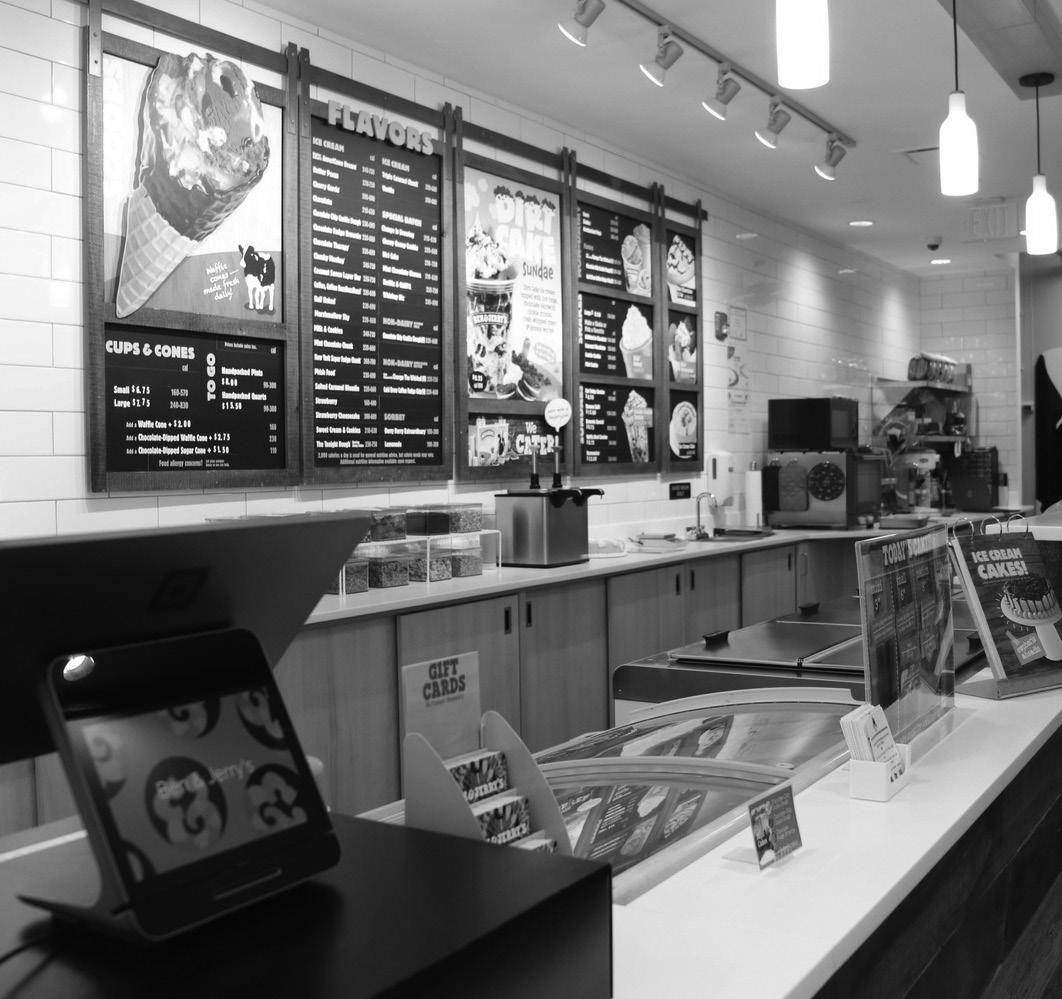
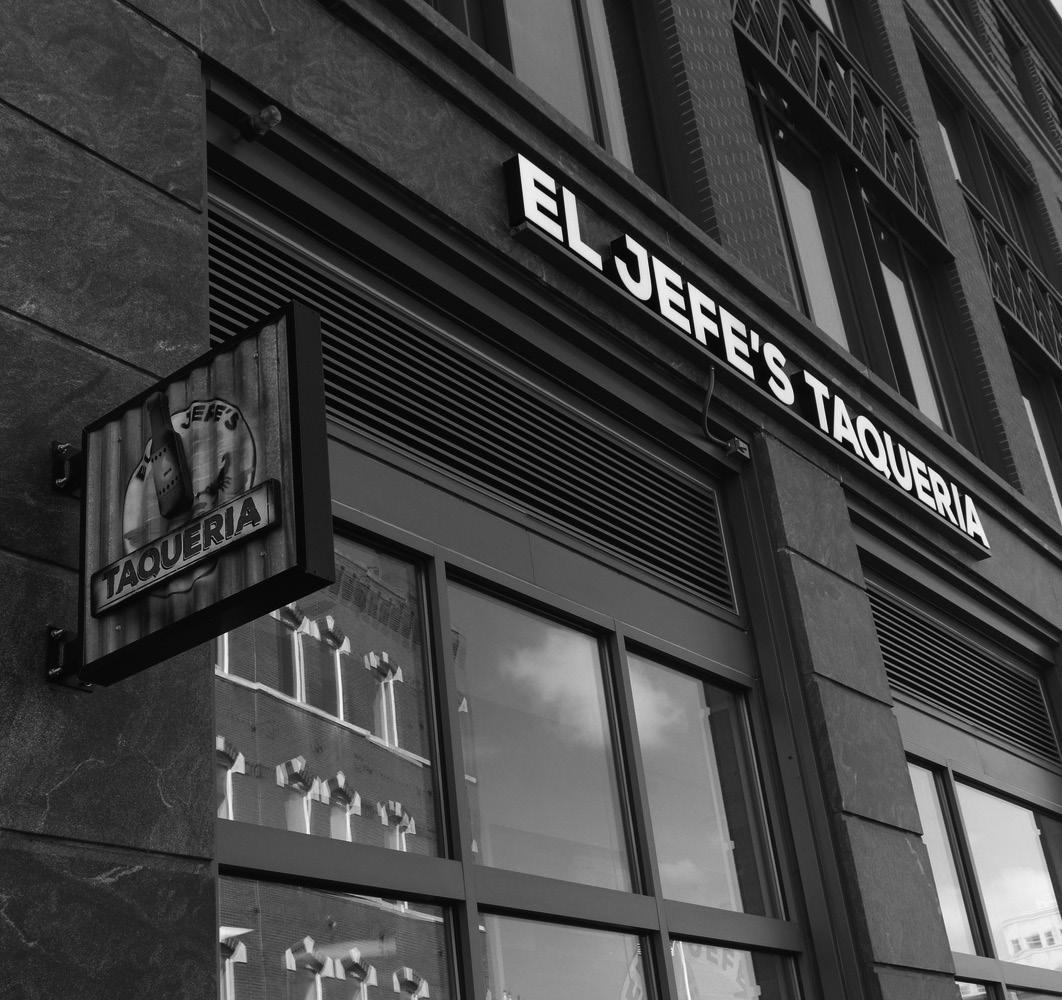
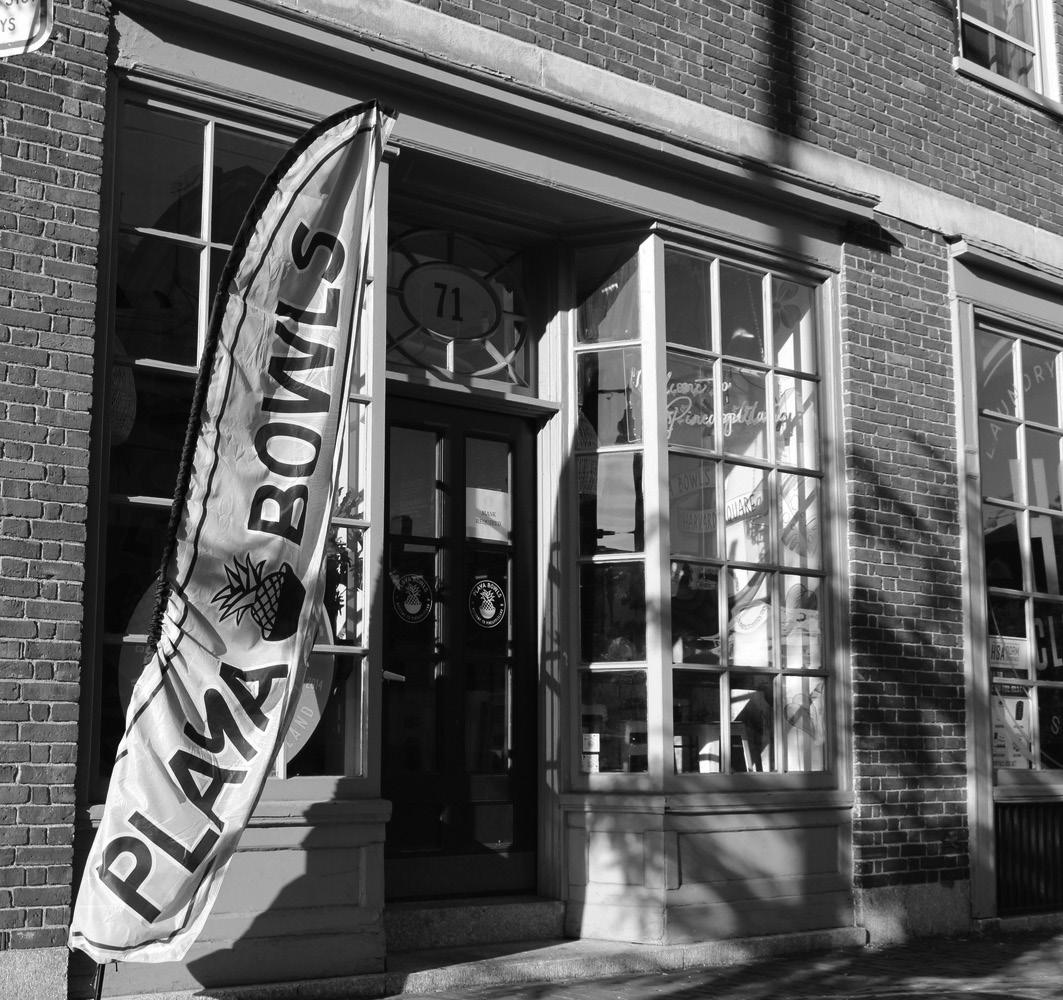

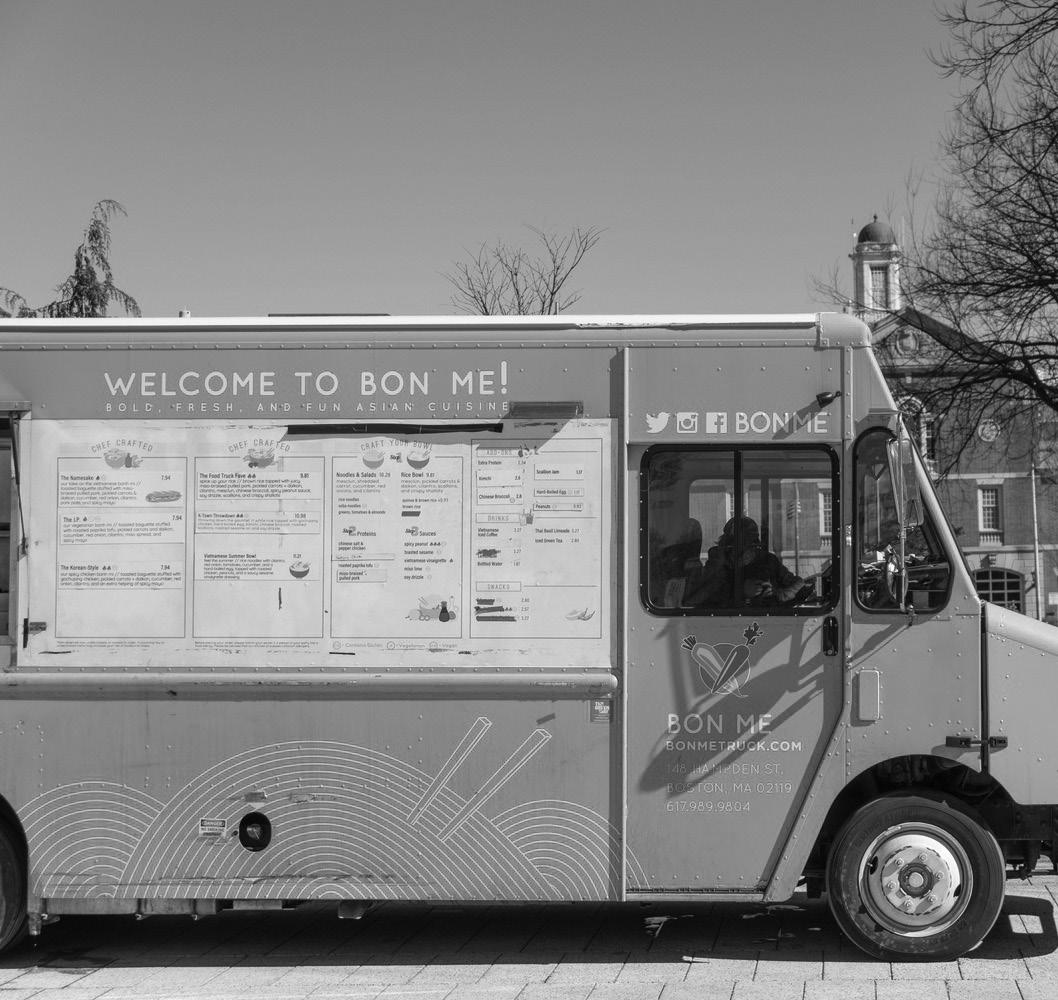

of
comps, and campus
doubt you’ll be eager for a break from the so-called “Harvard Bubble” soon enough. Luckily, Cambridge and Boston are full of great ways to escape campus and reacquaint yourself with the real world, whether just for a quick meal or for a daylong getaway.
Dunster tutor Shaan McGhie recommended that students explore the multiple green spaces around campus. She highlighted Mt. Auburn Cemetery for its “beautiful landscaping” and its easy commute from campus. “You can also rent kayaks to go down the Charles over in Allston,” she wrote in an email.”You get to see more trees and often will see turtles along the bank!”
If you’re looking to burst through the bubble while still tied down by coursework, Anya X. Zhang ’27 suggested a quick trip up Broadway.
“I have a few things that I like to do to get out of the Harvard bubble, one of them is to walk to the Cambridge Public Library,” Zhang wrote in an email. “It’s pretty close to the Yard, it has a lot of nice study spaces, and it has free printing!”
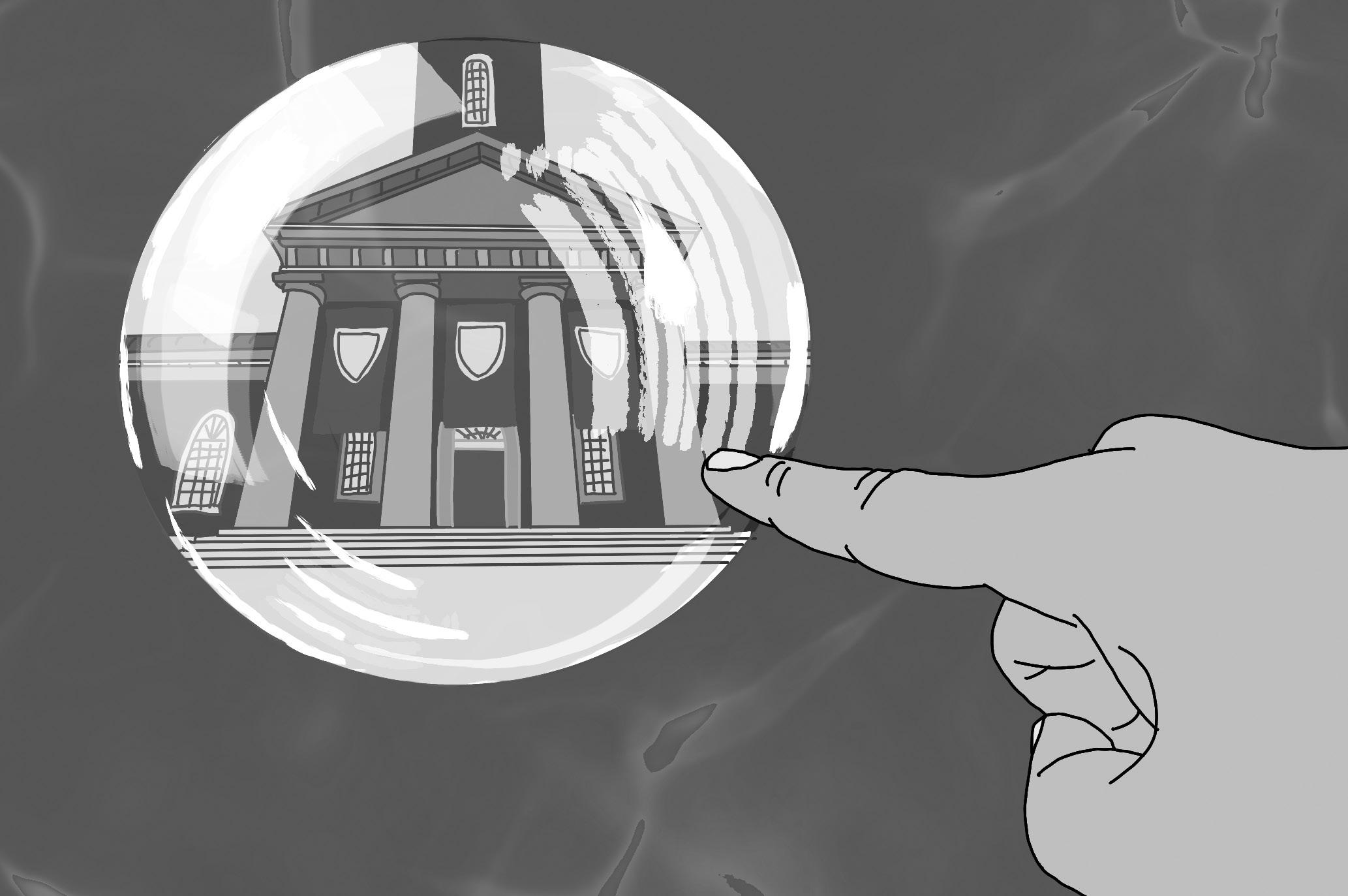
As soon as you’ve exhausted the many adventures near campus, it’s time to venture out further into the city of Cambridge.
Just one stop away on the T, you’ll find an eclectic mix of live music venues, thrift stores, and reasonably priced grocery stores in Central Square. This seat of local government boasts weekend activities for students looking to get out of the library. Harvard students regularly rely on Retrospect and The Garment District to seek out unique vintage pieces for their wardrobes.
While it’s easy to hop on the T and make your way to Central’s techy neighbor, Kendall Square, Miah Ebels-Duggan ’27 suggested investing in a bike to explore Cambridge’s many squares.
“We live in a very bikeable place with some of the best infrastructure in the country (low bar!) and it will extend your range so much,” they wrote in an email. “The T is getting better, but biking is often faster and usually more pleasant too.”
Whether you’ve walked or biked to Kendall, you’ll be greeted with a thriving scientific community. The research hub boasts exciting biotech and information technology firms, as well as a host of modern developments completely unlike Harvard’s red brick buildings.
If you’re looking to spend an afternoon here, the MIT museum and the Entrepreneur Walk of Fame are worth a visit.
Once you’ve seen Cambridge, you might be antsy to explore the city next door. Boston, the state’s capital, is never far — in fact, it’s just across the Charles, easily reachable by biking, bus, or the T. One place to check out is Boston’s popular Back Bay neighborhood. One of the few neatly organized grids in the city, Back Bay features several key strips frequented by tourists and locals alike. The center of Back Bay is the famous Newbury Street, where a fleet of shops, galleries, and restaurants can keep you busy for hours.
For a wardrobe update, Newbury Street boasts everything from H&M and Nordstrom to Cartier, and if you’re hungry for a bite, food options range from pizza parlors and taverns to French bistros and upscale oyster bars.
You’ll find another high-end mix within the neighborhood’s indoor mall, the Prudential Center, just next door to the historic Copley Library — whose beautiful halls and courtyard are a great place to work on long Saturday afternoons. Strolling up past Back Bay’s townhouses and mansions, you might walk off your lunch by the Charles Esplanade, where a lagoon and
charming walkways and bridges attract boaters, runners, cyclists, and picnickers alike. As a general rule, the central areas of Cambridge and Boston are accessible by almost any form of transportation — you won’t have to Uber or drive anywhere unless you’re looking for the extra comfort.
“I’ve had a ton of fun just walking aimlessly-ish around Cambridge and Somerville,” Ebels-Duggan wrote.
“The built environment is dense and interesting enough that a walk will never be boring and you’re always likely to find something new,” they added. In Somerville, another city lying just north of Cambridge, you’ll find a similar accessible and urban vibe, with a more local and affordable touch than Harvard Square. Host to diverse cuisines, and several great markets for food, crafts, and vintage goods, you can reach Somerville easily by foot, bike, or by taking the Red Line to Davis Square. Wherever you find yourself over the next few years, don’t be afraid to venture beyond Harvard’s gates to explore all that Cambridge and Boston have to offer.
BIG SPENDER. Harvard gives each undergraduate $65 a semester for food and drinks. Just don’t forget to use it.
Harvard Square has dozens of cafes and restaurants where you can get a sweet treat or spend your hard-earned money on a latte after a long day of schoolwork.
But what’s better than spending your own money?
Getting free food and drinks on Harvard’s dime.
Each semester, the College gives students $65 to spend at any Harvard University Dining Services location, whether that is a campus cafe, house grille, or dining hall. But with that much free money from Harvard, what’s the best way to spend it?
While the money from Harvard, known as BoardPlus, rolls over from the fall to the spring semester every school year, it does not transfer over the summer, giving students an entire academic year to spend their $130 of extra dining funds.
A few of the many places where students can spend their BoardPlus are House Grilles. Many Harvard upperclassman houses — including Dunster, Winthrop, and Quincy — have a grille where students can get anything from a milkshake to mozzarella sticks as a late night snack.
But if you’re in the mood for a coffee to keep you going, one of Harvard’s cafes may be more up your alley. Students manage and staff a plethora of options across campus, such as Barker Cafe, Cabot Cafe, Cafe Gato Rojo, and Lamont Cafe. Lamont Cafe — housed in Harvard’s all-night library — offers a range of items: from coffee and tea to cake, pastries, and boba.
Last term, Lamont Cafe released a special Lavender Haze boba drink, made with tapioca pearls and taro milk tea. When

Oliver L. Song ’27 found out about BoardPlus in the spring semester, he said he spent it twice per week on Lavender Haze boba runs.
“It’s, I think, seven to eight BoardPlus dollars, but it’s really cool. It tastes really yummy. It’s a beautiful color,” Song said. “I was able to get it, like, twice a week, basically for every single week of the semester, and that’s how I spent all of my BoardPlus.”
This past year, Tammy S. Lee ’27 found the Laboratory for Integrated Science and Engineering cafe — located at the entrance of the LISE Building on Oxford Street — where she spent most of her BoardPlus money.
The cafe sells Peet’s Coffee, which Lee said was part of the reason she goes there often, along with the convenience of its location.
“The owner of that place is really nice and funny, so right before I go to my Korean class building, I would stop by that cafe and spend all my BoardPlus money,” Lee said.
Bryan S. Gonzalez ’25 also named LISE Cafe as a favorite. Last year, he went to LISE every Monday for a treat to “start the week off” and push himself “through the rest of it.”
“It was a good practice,” Gonzalez said, “treating, but not actually spending my money, but my brain was tricked to believe that I was.”
Though many students like Gonzalez and Lee spend their BoardPlus money consistently throughout each term, if you find yourself with $62 towards the end of the semester, you’re not alone.
Kainoa S. Paul ’26, who once found himself nearing finals week with lots of extra BoardPlus cash, made his way to Harvard Law School to spend his remaining dollars. Throughout the year, Paul said he would go to the Law School to buy from their dining selection — which gives students options like mac and cheese and sushi — instead of eating whatever meal was offered at the dining hall. But with excess funds during
finals season, Paul stocked up on Yerba Mate at the Law School’s cafe. He said it was “a wonderful caffeinated drink to assist with final exam performance” and added that the cafe has “many items besides just food.” Harvard undergraduates have access to many of the University’s graduate dining areas where they can spend their BoardPlus. The Law School, the Graduate School of Arts and Sciences, the Harvard Kennedy School, and the Harvard Business School allow undergraduates to spend their BoardPlus on dining options such as custom stir-fries or burritos.
If you find yourself heading into Harvard’s Allston campus to go to the Science and Engineering Complex,
elyse.goncalves@thecrimson.com
In the next few days, Harvard first year students will be faced with a myriad of new and exciting challenges – not the least of which is attempting to remember the names of hundreds of new peers and friends you’ll meet. Let us do you a favor and get the names of a few Harvard administrators out of your way.
University President Alan M. Garber ’76
As Harvard’s newly minted president, Garber officially became the University’s highest ranking administrator in early August. Garber, who was Harvard’s provost for more than a decade, was praised for his handling of last spring’s encampment in Harvard Yard. While Garber may not be getting an official inauguration ceremony, his appointment has been met with approval from students, donors, and professors alike.
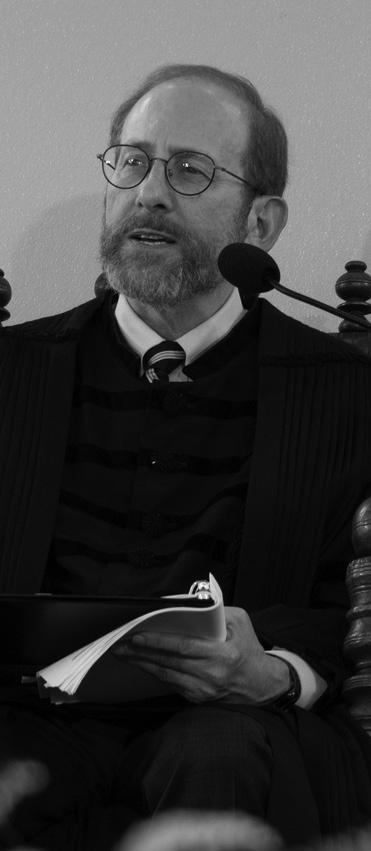
Harvard Corporation Senior Fellow Penny Pritzker ’81 Pritzker, who was U.S. Commerce Secretary under President Barack Obama, currently serves at the top of Harvard’s highest governing body, the Harvard Corporation. As senior fellow, Pritzker was in charge of the search committee which led to the appointment of former President Claudine Gay. As the leader of the Corporation, which has sway over all the Univer-
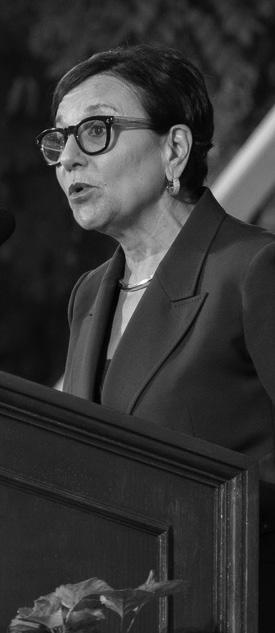
sity’s top decisions — including setting budgets and selecting deans of individual schools, Pritzker is among the most powerful people in Harvard leadership.
Provost John F. Manning ’82 Garber isn’t the one who received a permanent position over the summer. In August, Garber announced that Manning — the former dean of Harvard Law School — would permanently remain in his role as Harvard’s chief academic officer. Manning, a respected conservative legal scholar, stands out among Harvard’s largely liberal faculty.
Faculty of Arts and Sciences
Dean Hopi E. Hoekstra Hoekstra, as FAS dean, leads the
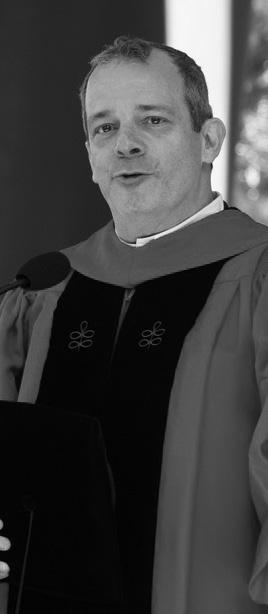
largest school at Harvard. The FAS encompasses Harvard College, the Graduate School of Arts and Sciences, and the School Of Engineering And Applied Sciences.
A longtime professor in the Organismic and Evolutionary Biology and Molecular and Cellular Biology Department, Hoekstra’s appointment elevated a scientist to one of the most powerful administrative positions at Harvard.
Hoekstra has served in the role for one year, succeeding Claudine Gay after she vacated the FAS dean position upon her appointment as Harvard’s 30th president.
Dean of Harvard College Rakesh Khurana
Whether you follow his Instagram account or saw him taking pho-
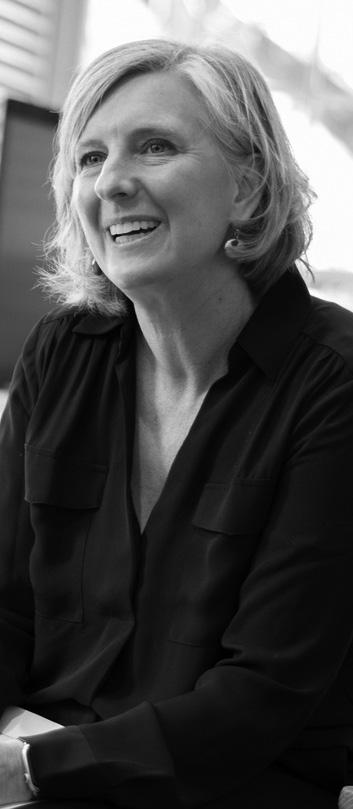
tos with students on move-in day, chances are you’ve already heard of Khurana.
As the Dean of Harvard College, Khurana is deeply involved with undergraduate’s daily lives, both inside and outside the classroom.
Registrar of the Faculty of Arts and Sciences Erika McDonald
Even if you never meet McDonald in person, you will no doubt recognize her name from the many emails about registration, tuition fees, and matriculation. McDonald and the Office of the Registrar handle many of the logistic details of an undergraduate’s academic experiences, from enrollment conflicts to final exam schedules.
Resident Deans
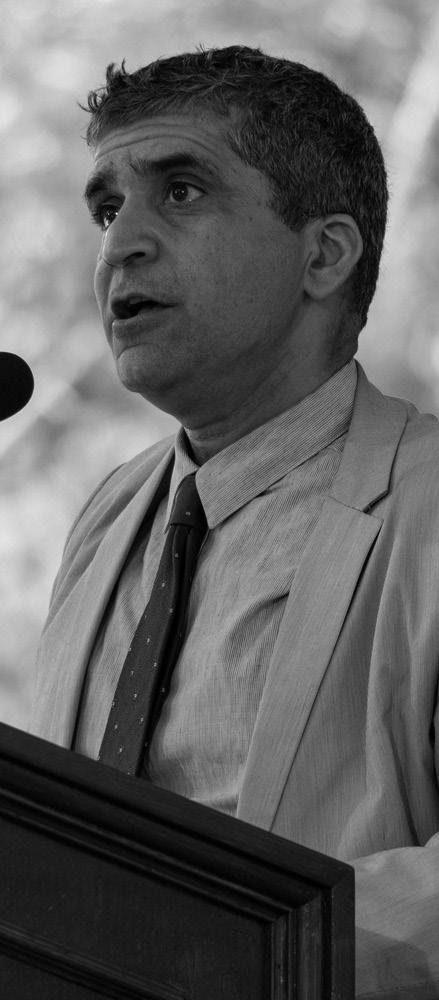
Unlike upperclassmen, who rely on the faculty deans at their respective houses, first year students receive support from the resident dean in their respective yards. The five freshmen Resident Deans live on campus, and are in charge of your academic, social, and mental well-being

Dear Professor ___________________________ (insert name here),
I hope you are doing well. I know it’s __________________________ (current time and its relation to the deadline), but would it be possible for me to take a few extra (units of time) on my _____________________ (name of assignment)? I was planning on finishing it tonight, but things have been ___________________________(adjective that conveys noble strength despite adverse circumstances). I was experiencing (mild stress related condition) after my ____________________(beloved yet distant family member) died. Finishing this assignment is my utmost priority and matters to me (dishonest adverb). I’m hoping to get it to you by ______________________ (lie). Thank you so much!
Sincerely,

(Your Name)

reading.
Sweet Ol’ Annenberg
As the fall semester approaches, Harvard Yard is ready to welcome about 1,600 new faces to campus: freshmenyes (aka frosh). The once-titled “pre-frosh” will transition to frosh and truly begin to understand what Dean Khurana means by a transformative experience. The “transformative experience” looks a little different for every student at Harvard, but there are some commonalities or, shall I say, opportunities that frosh won’t want to miss.
Feeling jittery about navigating Harvard’s campus and community? Don’t worry— there’s no right or wrong approach. Although there are ways to enhance your Harvard experience, and if you’re unaware how, don’t panic—Flyby has got your back, so keep on
You know that saying, “Maybe the real treasure was the friends we made along the way?” I’d like to think that’s how Berg was. While HUDS cuisine isn’t always favored by the student body (especially on grape pizza day), we loved to spend hours there, meeting new people and making friends. That being said, use your time wisely and take advantage of the fact that everyone is trying to meet new people during the first few months. Feel free to join random tables and dive into frosh conversations—it’s not awkward at all.
Explore Student Organizations Lucky for you, our school has over 400 student organiza -
tions, meaning there is a place for everyone here. No matter what you’re looking for, chances are there is a developed group with similar objectives. If not, why not start your
you—and that’s okay. :) Build Connections
Outside of building bonds with peers, it’s important to inter -
While HUDS cuisine isn’t always favored by the student body (especially on grape pizza day), we loved to spend hours there, meeting new people and making friends. That being said, use your time wisely and take advantage of the fact that everyone is trying to meet new people during the first few months.
own? Joining clubs and attending info sessions will allow you to continue your passions, discover new ones, or make you realize something may not be for
act with faculty outside of classroom hours. Spending time with faculty during office hours or coffee/tea chats can help them understand you as not only a
Whether you’re an incoming freshman or a socially confused upperclassmen, conversation at Harvard can be more challenging than even your hardest classes. Thought Poisson distribution was hard? Try holding a conversation. With underlying meaning and inflection, it can be difficult to decipher someone’s true meaning and intention. That’s why we’ve compiled a few common passive aggressive phrases to keep in the back of your mind during the conversation or when you overthink about it after (or maybe even to use on other people ;)).
Social Passive Aggression
student but as an individual. As you go into your freshman fall and spring semester, make an effort to reach out to all your professors, as they are fundamental to your academic journey and success. Trust me, faculty want to learn more about you and your way of thinking.
Traditions (At Your Discretion)
Some of the best memories of my freshman year involve Harvard traditions. From participating in the First-Year Outdoor Program in New Hampshire to attending the Harvard-Yale game or singing with friends at Yardfest, these traditions highlight the strong sense of community at Harvard. Always be sure to take time to enjoy where you are, and if you’re up for it, take part in traditions like River Run, Primal Scream, or leaving your mark on the John Har -
vard statue (if ykyk). As you kick off your transformative experience, remember that this is your time to explore, connect, and, yes, occasionally survive grape pizza day. Everything will feel new at first, and adjusting takes time, but all frosh go through it. Welcome to Harvard!
What they say: “We should grab a meal sometime!” What they mean: They just want to end the conversation quickly. They most likely don’t actually want to grab a meal, but just want a way out of the conversation without being an asshole. Occasionally, though, someone will mean it with good intentions, so use your discretion.
What they say: “You can use my Calendly to schedule our hangout/ I’ll send you a G-Cal invite.”
What they mean: They’re busier than you in every possible way. Absolutely DO NOT actually schedule a casual hangout using their Calendly. If they can’t juggle their social life and school without an online planner, then they probably don’t have time to be good friends.
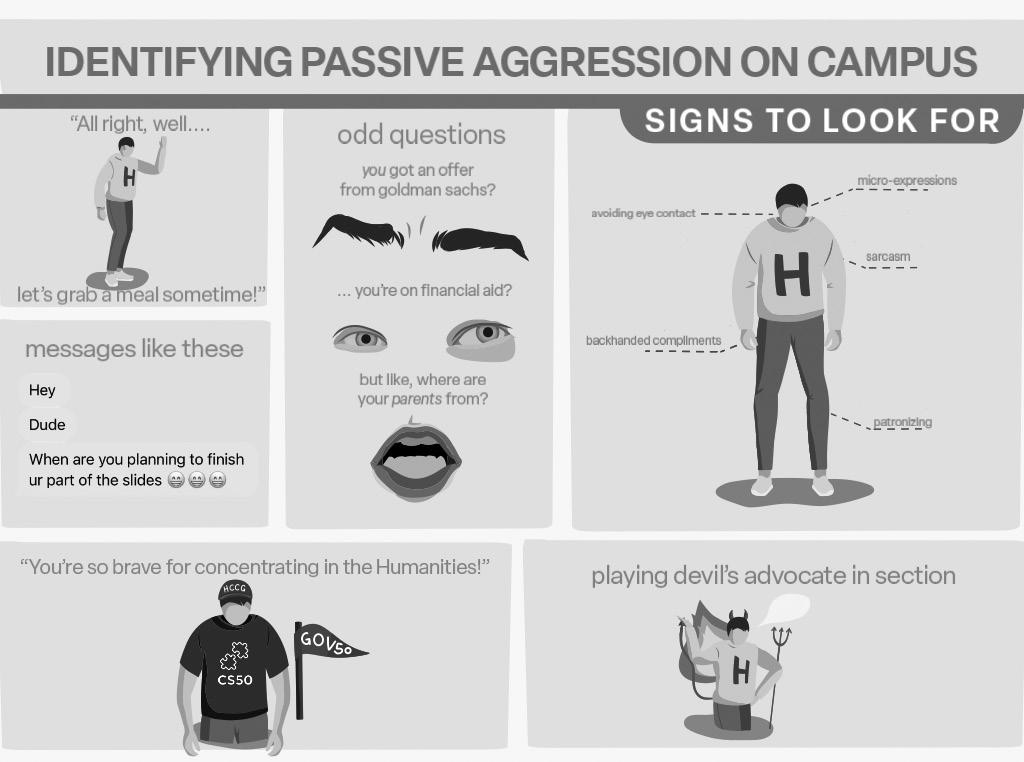
What they say: “It’s really competitive.”
What they mean: There’s two meanings for this phrase depending on the club that you’re talking about. Option one is that the club comp is actually open and completion based — so, lowkey, they’re making fun of it. Option two is that the club is actually really competitive, and they don’t want you to apply as competition. They’re trying to imply that you’re not qualified enough to join. Don’t let this deter you from applying: you’ll likely make it in.
What they say: “I’ve never heard of that club.”
What they mean: They’ve definitely heard of the club, unless it’s super niche like a club we wanted to reference here but couldn’t think of because we haven’t heard of it. This person actually submitted their application before even showing up on campus, and are friends with the club’s board and president.
School Passive Aggression
What they say: Maybe you should go to office hours/ MQC if you have so many questions.
What they mean: Please stop asking them for help or pset answers. They’re probably just busy or you’re asking at a bad time. I’m guilty of saying this one, and you probably should go to office hours to work on the assignment.
What they say: That exam was really hard! I didn’t fin -
ish early. (Extra points if you’re actually sobbing/complaining about the exam in front of them.) What they mean: They’re simultaneously stressed about how they did on the exam, and still think they did better than you. But don’t worry! It’s Harvard, so you passed. Unless it’s Math 21B.
What they say: I already finished that assignment… What they mean: Unless they really are ahead on their work (a very low probability), they probably haven’t finished the assignment, and want to see how far you actually are on it. You’ll see them in office hours right before the assignment is due to finalize answers. Give them grace, as they’re probably stressed from the assignment already.
What they say: I heard that class is supposed to be a gem. What they mean: Unless they’re also taking the class, they’re definitely judging you for taking easy classes, and not academically challenging yourself. Please use your free time to find new friends.
Most of the time, these passive aggressive phrases are signs that you should talk to someone else, or find a new partner. If you’re continuing to receive these phrases, I recommend reflecting inwards and identifying that maybe you are the problem. Whatever the case may be, good luck navigating Harvard’s complex social scene.
FIRST IMPRESSIONS.
Flyby’s guide to the freshman year memories you’ll wish you could forget.
BY EMERSON GIESE CRIMSON STAFF WRITER
We all remember freshman year. Your young, hopeful self, so full of optimism and excitement, not yet aware of the sometimes less-than-appealing Berg food (can we please have another conversation about grapes on pizza?!), the endless psets, and the insane amount of time spent in Lamont crying. Some of us probably wish we could go back to our optimistic, naive freshman self. Others of us, well, we remember the less commemorable aspects of freshman year that easily alleviate any FOMO we might have. Here are a few awkward freshman moments we should all be grateful to be rid of…
Move -In
Move-in day is very exciting for most freshman. You get to meet your suitemates for the first time, filled with hopefulness that these people will be your bridesmaids/ groomsmen and you’ll never want for another friend again in your life. While you now know that this was wishful thinking and probably have your fair share of horror stories, there was no dimming the optimism as you got to your new home for the coming year. However, the deterioration of the optimism is rapid, as you’re put in a room with a bunch of people you know little to nothing about, all of whom are try-
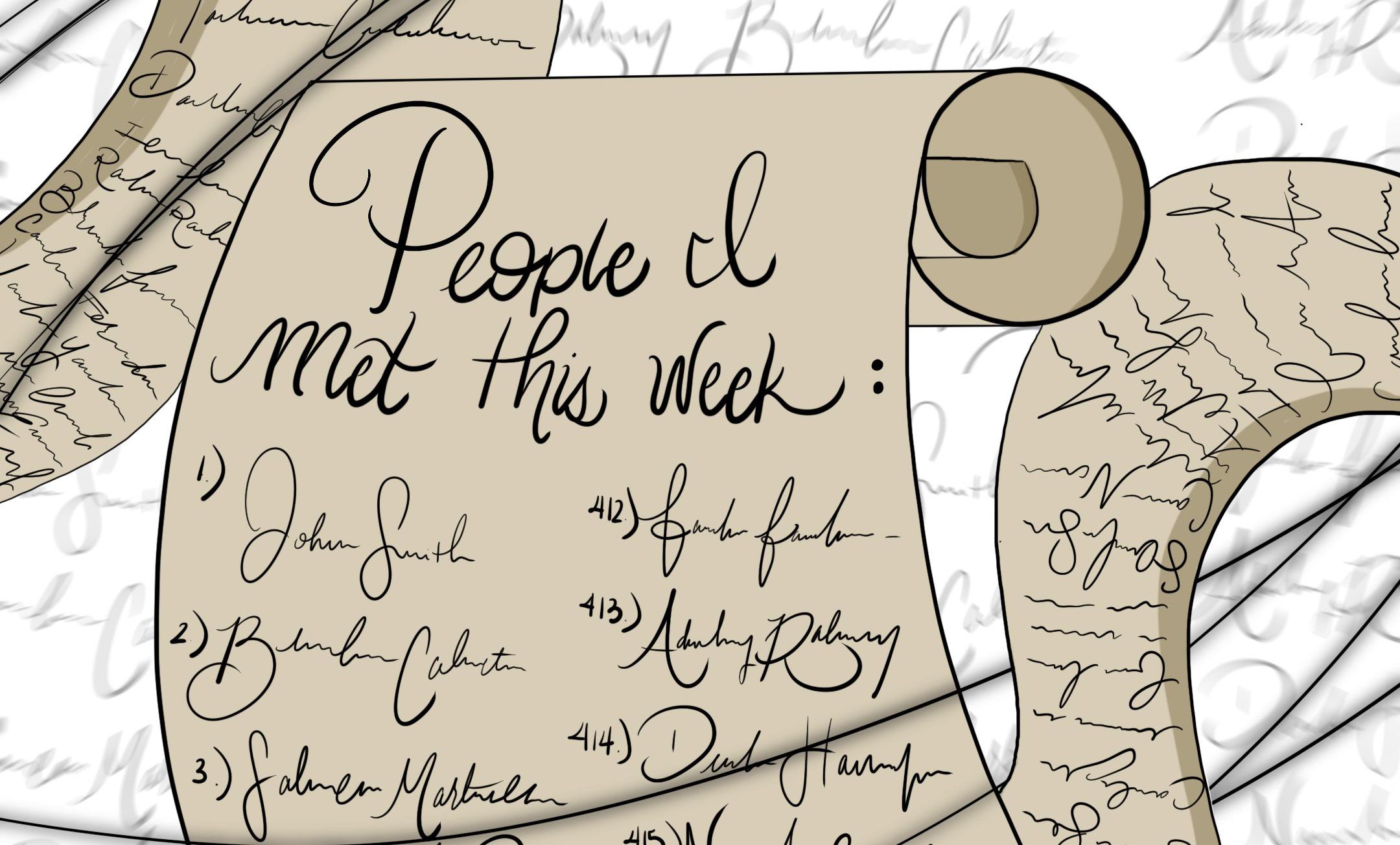
ing to decide which desk is theirs, what to do with the dressers, and where to put the excess of suitcases sitting in the common room. It’s chaos, and you find yourself not knowing whether or not to advocate for yourself or sacrifice your comfort in order to start out on a good note with your roommates. Parents are spewing out ideas and you don’t even know any of their names. Once the room is finally figured out and everyone is a little more quiet, you get acquainted with your roommates for the first time under the watchful gazes of parents, siblings, and maybe even a grandparent. Do
you hug? What do you ask? What is there to talk about? Maybe you ramble about your flight in order to fill the silence, but there’s no denying it. It’s awkward. And it only gets worse from there.
New Names
Remember the conversation you had at least a thousand times in the first few weeks at school? The one where you’d be at some sort of freshman event, and you’d make awkward eye contact with someone. You go over and introduce yourself, starting the very basic and tiresome

Meeting with PAF vs. “We Should Grab Lunch Sometime”
One thing you will quickly realize about Harvard: very few conversations are what you would consider… normal. That is to say, many of the conversations have a subtext of evaluation without being overtly evaluative. Or, sometimes they are. You’ll see what I mean. So, a fun game to play in Berg is: Guess! That! Convo!
First Date vs. Club Interview
Both include weirdly invasive questions to evaluate a potential match. Both should absolutely not be happening in Annenberg. Potential questions include, “where are you from,” “where do you see yourself in ten years,” and, “what did you do in high school?”
One person is vastly more interested than the other. And yet, somehow, they’re both just pretending to care? One of the people will say things like, “wow, it’s been so long since we last talked! We need to do this more often!” And the other will pointedly not agree.
Went to the Same High School vs. Ex of Ex
There’s a shared trauma running deep below the surface that the mere eavesdropper can only imagine. But there’s also a shared feeling of being better than everyone else. They mention a café with a shared grimace — but is it a popular Stuy haunt or a shared
break-up locale?
Pset Group vs. Polycule
They’re all over each other, and never seen apart. They know each other’s bedtimes and coffee orders. Sweatshirt ownership is just a suggestion. Okay, one of these options is more likely. But the other is way more interesting. And who’s to say one can’t lead to the other…
Bonus (and this one I guarantee you will experience): are they flirting, or are they trying to get me to check my voter registration and request a mail-in ballot?
Have fun both playing this game and getting into these quintessential Harvard situations yourself! But if you’re on a Berg first date, come on. Surely you could at least spring for BoardPlus.
eve.jones@thecrimson.com
Harvard introduction, that you will surely repeat for your next four years. What’s your name? Where are you from? What are you thinking about concentrating in? Oh, interesting. Yesss, I’ve met a few people planning on concentrating in Government with a secondary in Economics. Etc. Etc. The people, concentrations, and places all started to blur together after a couple dozen introductions, and you find yourself forgetting the name of the person halfway through the conversation. Do you ask again? What if you see them again and they ask if you remember them and you don’t
even know their name? Do you ask again? After all of these contemplations, you realize you had missed what they had answered to the last couple of questions, and you’re now entirely screwed. The conversation is now a dumpster fire and you find yourself awkwardly nodding along.
Do I Wave?
Saying “hi” or waving to people you have had brief interactions such as the one above can be a dangerous business. Since everyone has had so many similar conversations, it’s hard to remember exactly who you
have enough of a relationship with to greet on a daily basis. You pass by someone you know that you’ve met, but you’re not sure whether or not to wave. You think it through as you contemplate whether or not to greet them. Are they looking at me? Do they remember me? What if I wave and they think I’m weird because they don’t remember me? You finally decide to do a little smile and say hi as you pass them, but nothing comes in return. No smile, no wave, no hi back. Did they not notice it? Did they think you weren’t talking to them? The people around you are giving you a hard time for it, and you’re thinking about how you will never wave to anyone again.
Dorm Parties
Dorm parties were a necessity for your first year. You met new people, tried new things, and really started taking advantage of the college experience. Unfortunately, because of the watchful eyes of the proctors, the parties had to be decently quiet. This led to an environment prone to awkwardness. Music barely playing, conversations solely surrounding school and the basic aspects of a person, it became an environment for the iconic Harvard freshman conversations to be had and little more. Or, if you decided to take the risk and have an actual party, it usually was ended by a proctor in thirty minutes or less. Yay Harvard! College is crazy! While these moments are necessary, character-building, and sometimes funny, I think I speak for most of us when I say that I’m happy to be past that stage of my college experience. It gets better, freshmen. I promise, it does.
emerson.giese@thecrimson.com
BY ANNETTE KIM AND HAILEY E. KRASNIKOV CRIMSON STAFF WRITERS
Welcome to Harvard and to some,
welcome back! As the new semester encroaches upon us, we would like to take a moment of reflection and pass on to the next generation the campus lore from the past few years.
Obama’s Footsteps
We are always manifesting our favorite alum and former POTUS Barack Obama to grace our campus with his presence. Particularly up for debate… was he there for former President Claudine Gay’s inauguration?
Tasty Burger Crash
A cautionary tale. The next time you think about jay-walking, remember that an Electric Harvard Shuttle crashed into Tasty Burger one night. Nobody was hurt! Except, well, the bus.
Grapes on Pizza
That one time HUDS blew everyone’s mind by putting grapes (yes, that’s right, not grape tomatoes, actual grapes) on pizza. Everybody’s
new favorite topping and the epitome of creativity. Long live grapes on pizza.
Yard chairs
Any time you are asked about Harvard’s incredibly large endowment and tuition costs that increase each year, your go-to explanation will be the yard chairs. That’s right, $700 for a colorful metal chair… is it just us, or is inflation getting out of hand?
Lamonster
Your friends who you haven’t seen for days that are usually just living in Lamont Library. Some people bring mattresses and blankets during finals. You’ve been warned!
Tasty Basty
Tasty Burger has a bar and party area in its basement that clubs rent out. It is typically the center of freshmen social life (besides MIT).
The UC
Our former form of student government. We (those of us who voted, anyway) decided to get rid of them and just rebrand to HUA. How is it different? Good question!
Color/Crimson Clear
Back in the day of Covid tests, we had to use this little website to prove to Harvard we were healthy! Go shove a stick up your nose, for old time’s sake.
Winthrop Grille
As we are both Winthrop Residents, we are saddened to inform you that the Grille was open for a brief period of time, but has once again been shut down. Hopefully you can enjoy the wonders and mozzarella sticks of the Grille during at least one semester of your four years at Harvard. Until then, you have the Eliot, Dunster, Quincy, and Quad Grilles.
Red’s Best Fresh Catch
Once upon a time, the locally caught fish HUDS now serves was called Red’s Best Fresh Catch. We still wonder… What happened to Red? Where are his best catches? Perhaps the best catch are the friends we made along the way. That’s all the wisdom we have to offer for now Class of 2028! Good luck figuring out the rest of the Harvard Bubble.
annette.kim@thecrimson.com hailey.krasnikov@thecrimson.com
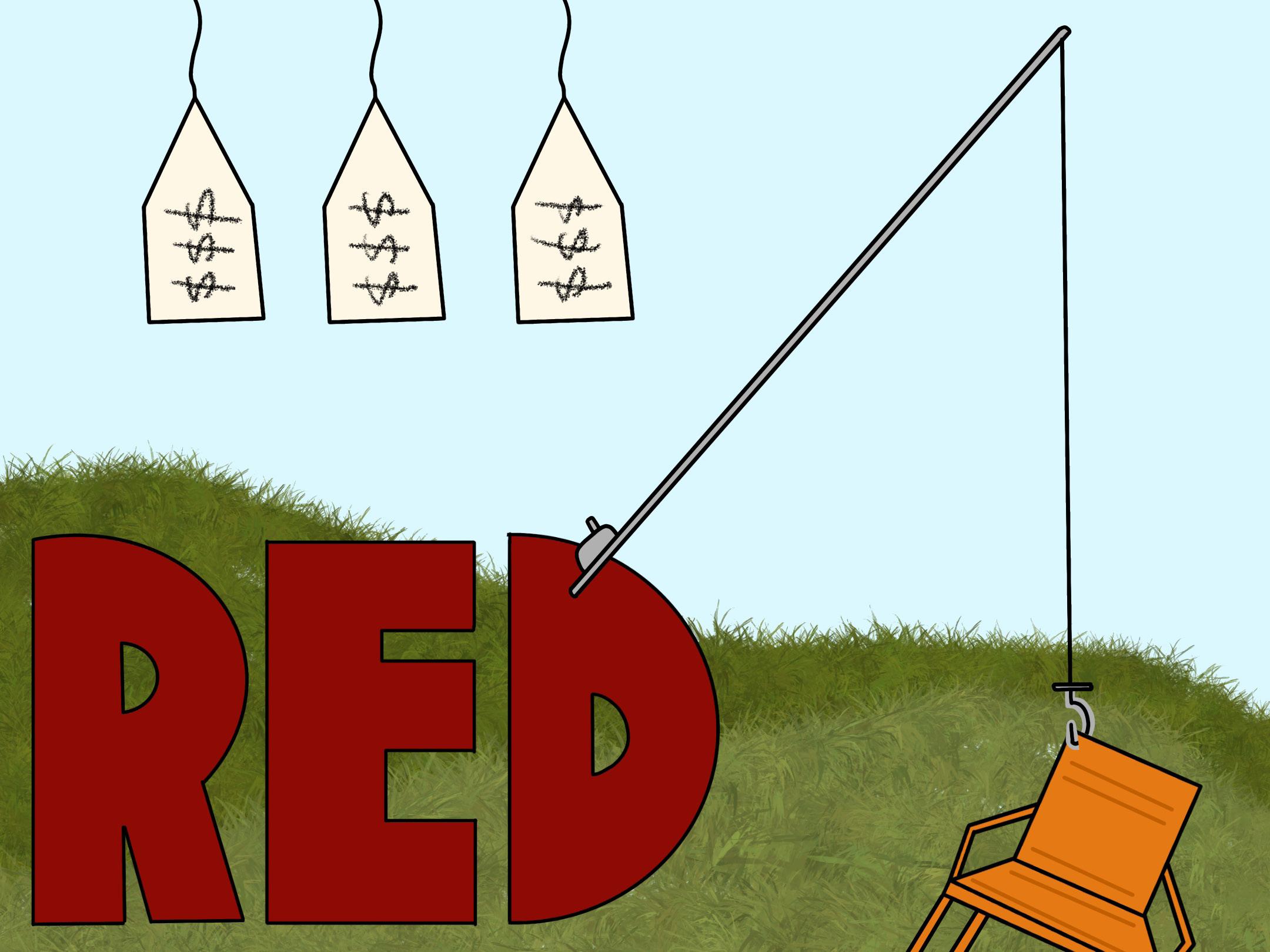
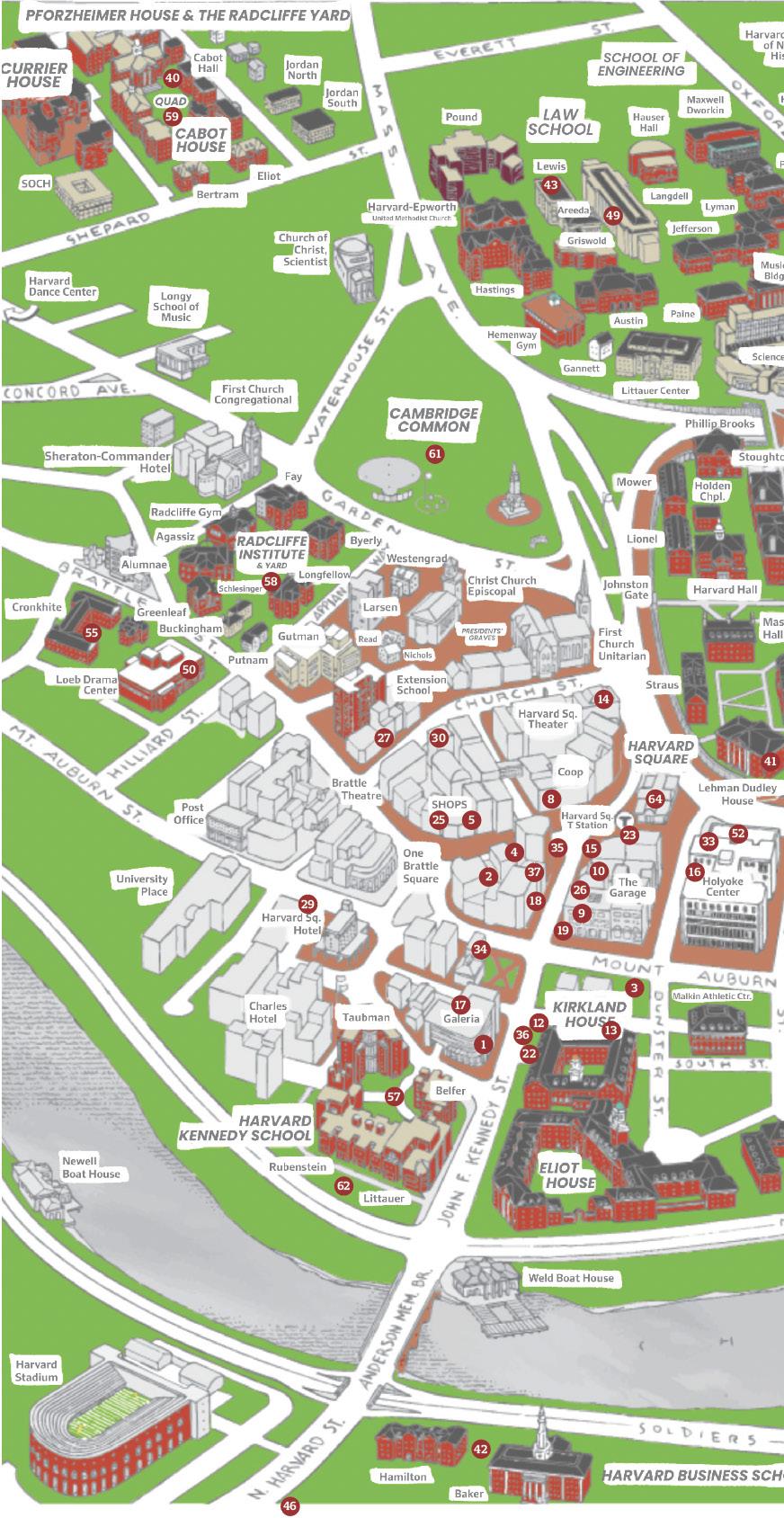
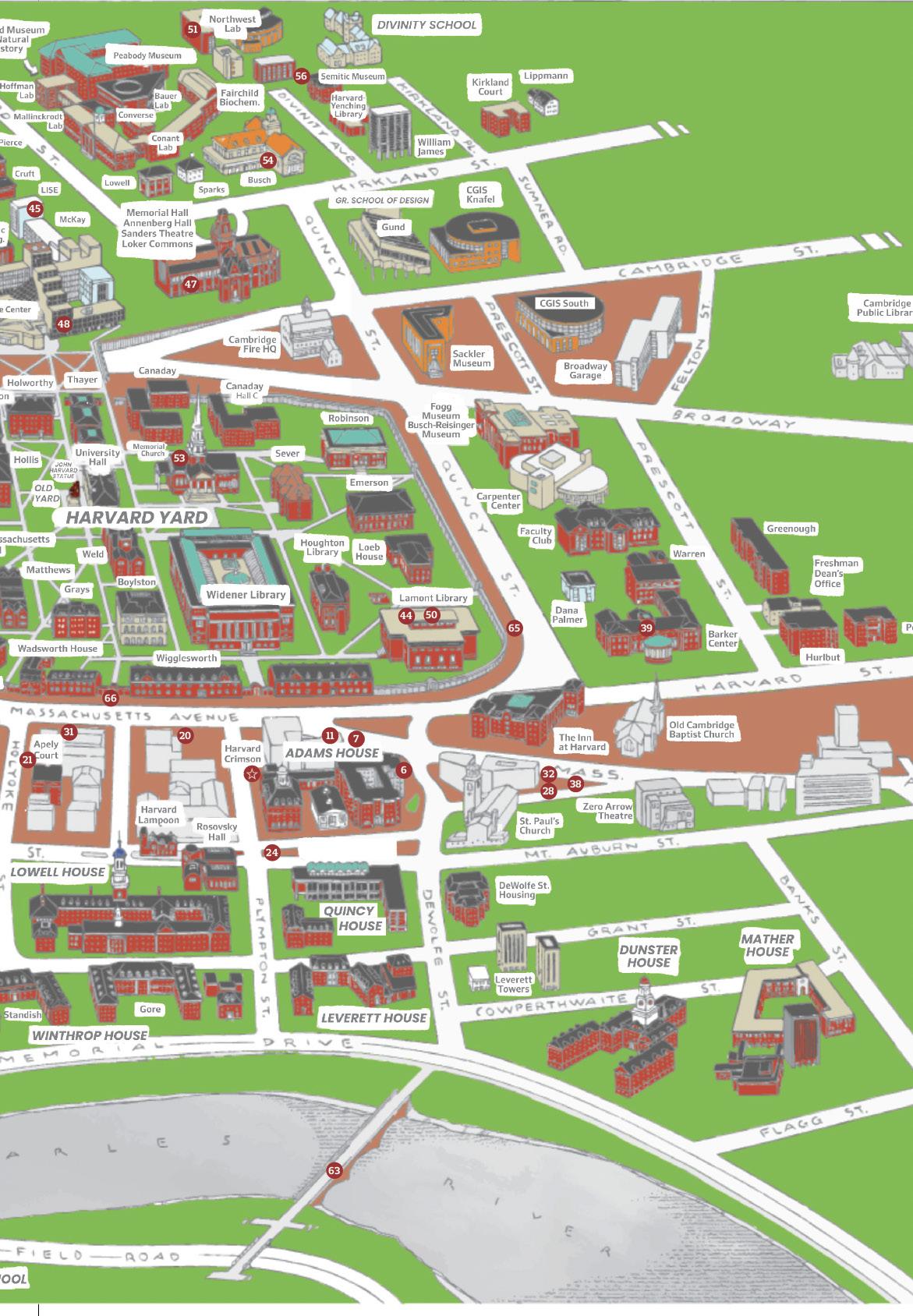
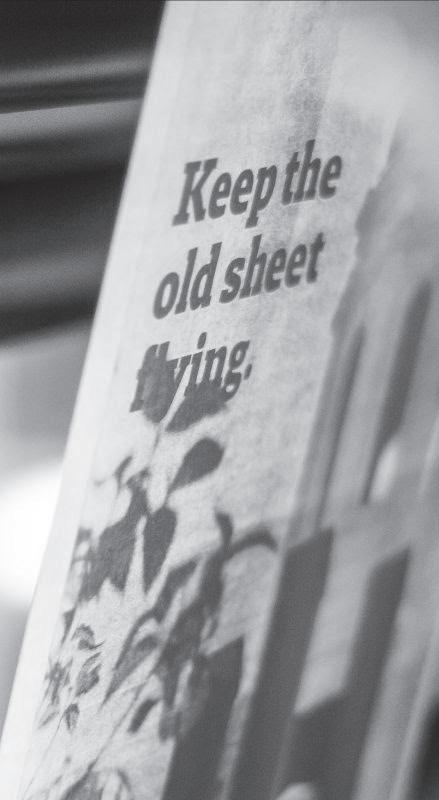

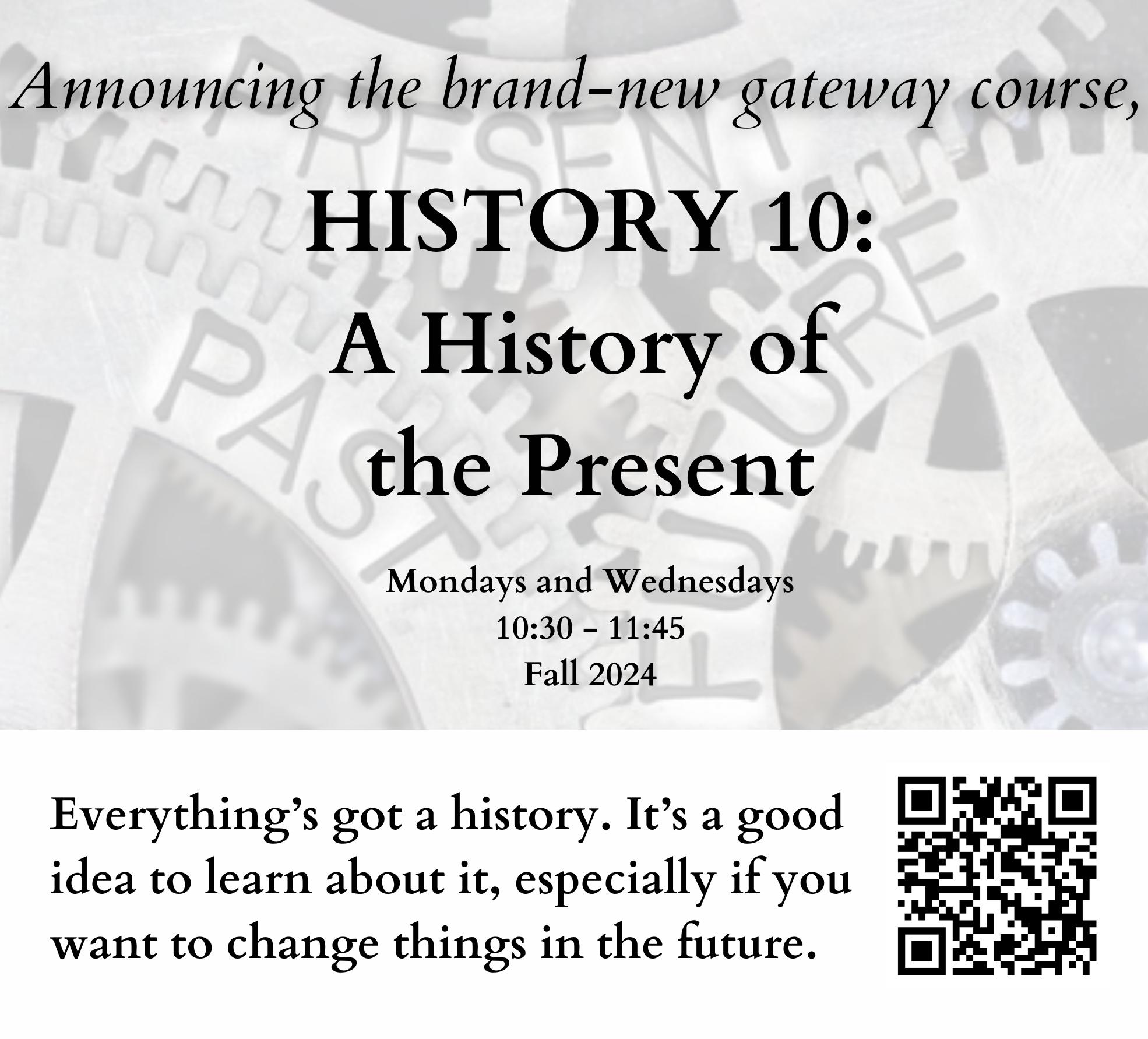

Our eyeglasses start at $95, including prescription lenses.
(We do sunglasses and contacts, too.)
